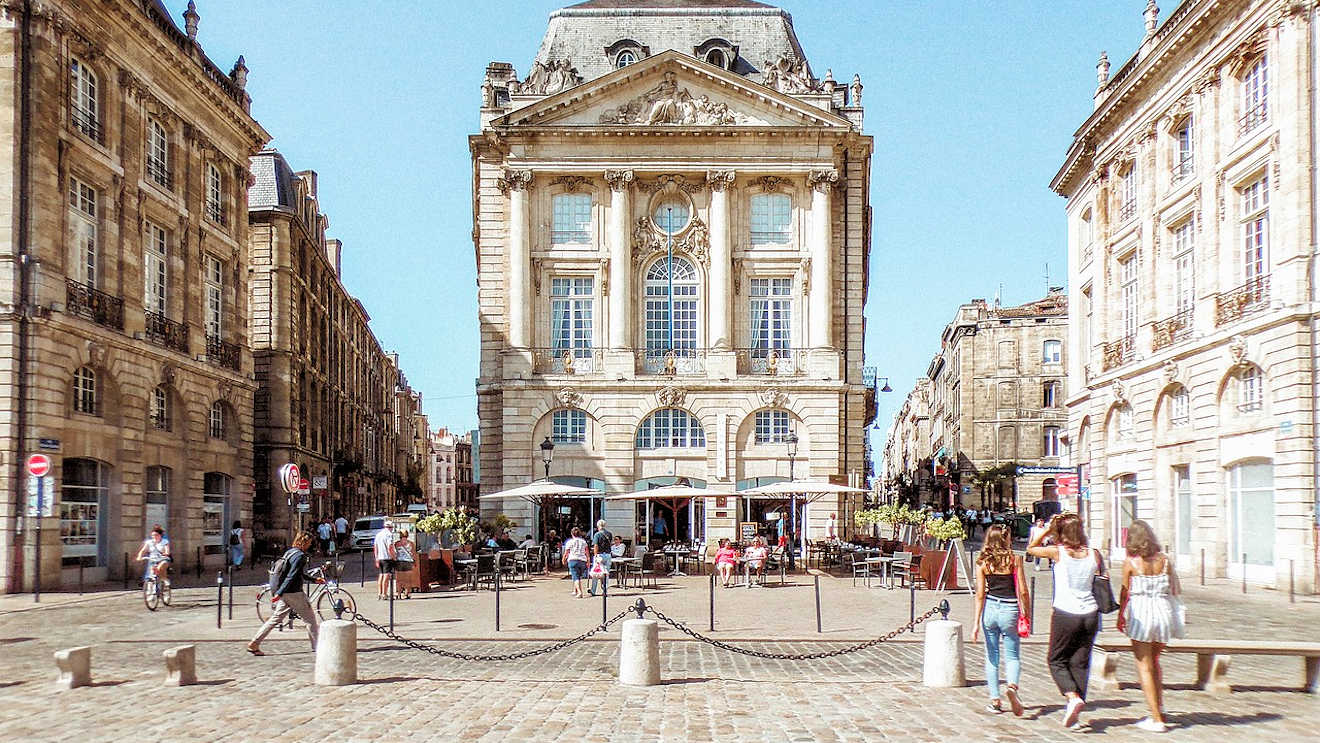 Bordeaux, France
Bordeaux, France
10 best places to live in France in 2026
|
France regularly features in the Top 10 list of the best countries in the World to move to. In fact, Forbes magazine placed France at #6 in the list of the best countries to live to in 2026 [SOURCE: Forbes] and the French town of Pau in Southern France was recently voted the Number One destination in the world for retiring overseas. (SOURCE: 10 best places for retiring overseas).
Here we analyse where are the 10 best places to live in France in 2026, covering the best cities in France to live in, to retire, to invest in property and the best places to study in France. We also cover the most affordable places to live in France, as well as the cheapest places in France to buy property.
Finally, by looking at actual research on a range of factors from property prices to quality of life indicators and climate, we also highlight the best regions in France to live for ex-Pats and English speakers.
Best places to live in France in 2026
When I started writing this article back in 2023, I consulted a number of existing surveys and read numerous articles on the best places to live in France. I have since updated it for 2026, based on newer research and feedback from people who read the article and came up with additional suggestions.
In terms of the surveys, there really was not as much overlap between them as I was expecting. So, for instance, an article by the travel magazine, International Living, identified the following 5 towns and cities as the best places to live in France:
International Living - list of best places to live in France for English-speakers
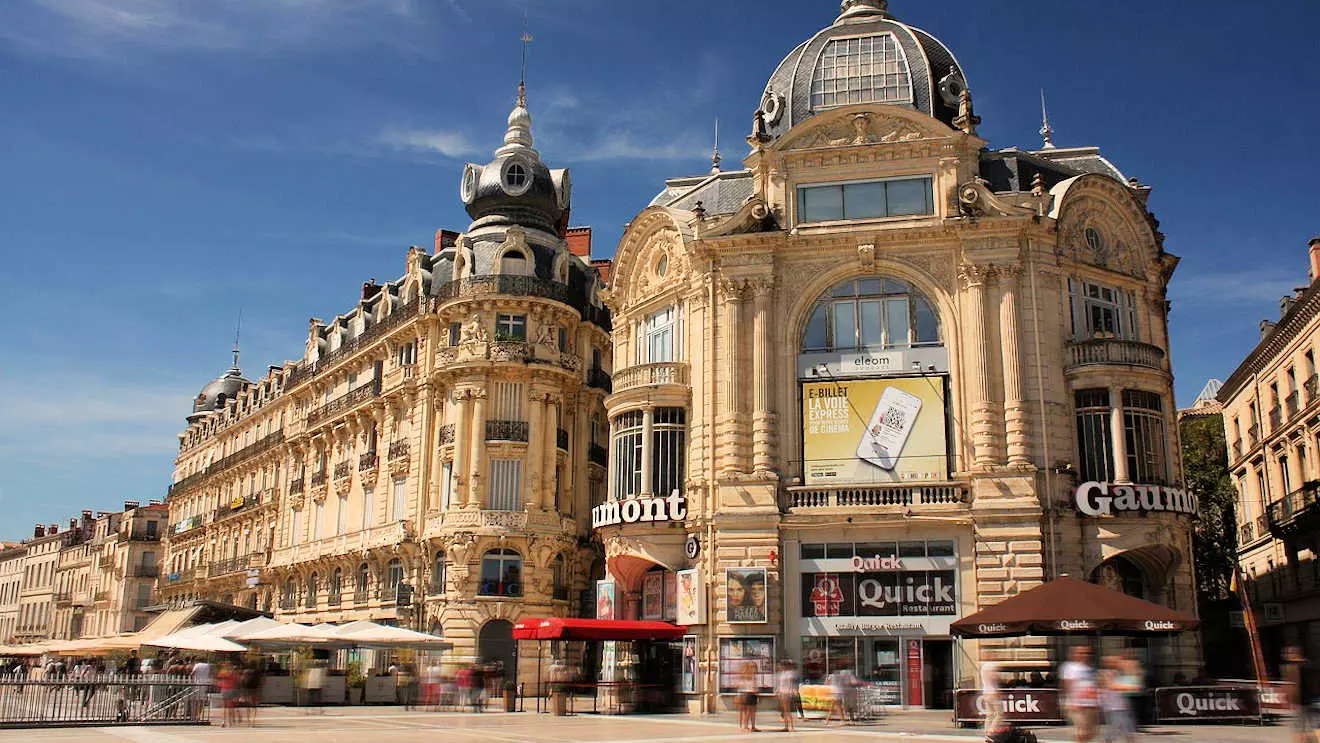 Montpellier, South France
Montpellier, South France
- #1 Lyon - due to its culinary tradition, chic neighbourhoods and big city facilities
- #2 Montpellier - its Mediterranean climate, historic centre, the excellent reputation of its universities and extensive tram network
- #3 Sarlat, Drodogne - its charm, local cuisine and arts festivals
- #4 Bordeaux - mild climate, wine, business
- #5 Pau - a good retirement destination: warm climate, close to Pyrenees, golf clubs and hospitals
SOURCE: International Living - best towns France
So, yes, Lyon is a nice city and it is true what they say about the many good restaurants. I did some work in Lyon back when I had a normal job and we also stayed in the city last year. The centre of the city is really pretty (in parts), with a beautiful main shopping street (Rue de la République), which has Haussmann-style buildings, reminiscent of Paris. But I am not sure I would want to live in Lyon itself, unless I had a good job in the area. But if you are into winter sports, then Lyon does have the advantage of fast roads up to the Alps.
Montpellier, yes, I will give you that one. Montpellier is our nearest big city and I love it. We have also highlighted it below as one of the best places in France to study.
As for Sarlat, yes absolutely, a great place to visit, but in terms of living there, I think that you would feel like you were living in a film set for a period drama. It is just an all year around tourist attraction. We were in Dordogne in the summer and it is very beautiful. But at the same time you couldn't help thinking 'what goes on here in the winter?'. I also have to say that I thought that the town of Brantôme was a prettier place than Sarlat.
We stayed in Bordeaux this summer and I was very impressed. So it gets my vote. Lots of nice squares, a really long shopping street (I think the longest shopping street in Europe) and some excellent restaurants. But as I outline below, Bordeaux itself is very expensive (the second most expensive place to live in France after Paris), so I would probably suggest having a look at the towns surrounding Bordeaux (such as Libourne).
Finally, it is a couple of years since I have been in Pau, but my overriding memory is that it seemed a very organised sort of place. The old town is lovely and you got a feeling that it is a very safe place. But I just wonder if there is enough going on in Pau. Also, I have to say that, everyone I have spoken to about Pau being voted the #1 destination for retirement in the World, have all said the same thing - "Really??, what Pau in France?". That is both French people and Ex-Pats.
Compare my Move - 7 best region to live in France
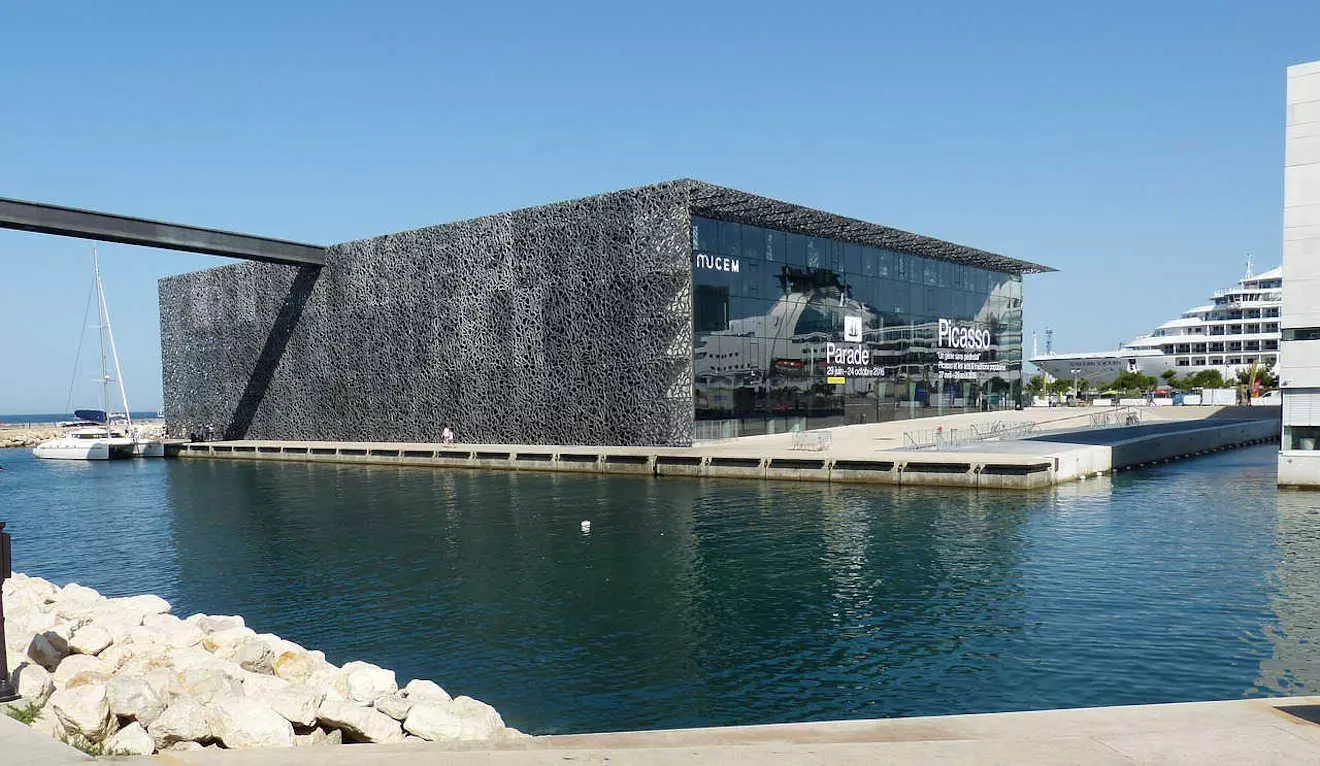 Marseille
Marseille
A similar article by the relocation services company, Compare my Move, identified these 7 places in France as the most popular destinations in France for their international clients. To be fair the article is mainly describing where the majority of their clients choose to move to in France, but let's just say there were a few surprise inclusions here. I think that it is just a 'lazy list' compiled from the list of the biggest cities in France, with the Dordogne thrown in there because the writer went on a school-exchange trip once. But here is their selection:
- #1 Paris - other than it being Paris, no other reasons given
#2 Montpellier - slower pace of life, beautiful boulevards, cheaper than Paris - #3 Nice - warm climate, museums, culture & festivals
- #4 Dordogne - beautiful villages and countryside, large ex-Pat (British) population
- #5 Bordeaux - architecture, shopping, Cité du Vin wine museum and the Place de la Bourse
- #6 Marseille - cheaper living costs than London and 'improving' crime figures
- #7 Lyon - UNESCO World Heritage centre and gastronomy
SOURCE: Compare my Move - Best Places to Live France
In terms of this list: Paris, if you have deep pockets and can afford to live in the better arondissements, absolutely. If not, then it is crowded, expensive and best enjoyed at a distance. Nice, yes it has the Promenade des Anglais, lots of high quality museums and some excellent festivals. You are also on the French Riviera, so you can't really go wrong. I am just not sure it is a place I would want to live in all the time.
Marseille - right you are having a laugh! I do actually like visiting Marseille and there are some beautiful places nearby, like Cassis and the Calanques. But Marseille is by far the most dangerous city in France. The Vieux Port is a really nice district for bars and restaurants, but if you literally move two blocks away, then you are walking with your eyes wide open and your wits about you. Nothing bad has ever happened to us, but we have seen things which make you take care. The people from Marseille are great and I do get the impression that if there is trouble, it is between people that know each other. So visit Marseille by all means and if you are used to inner city living which has a bit of an edge, then yes, give it a go. But it wouldn't be #6 on my list.
ExpatRA - best area to live in France
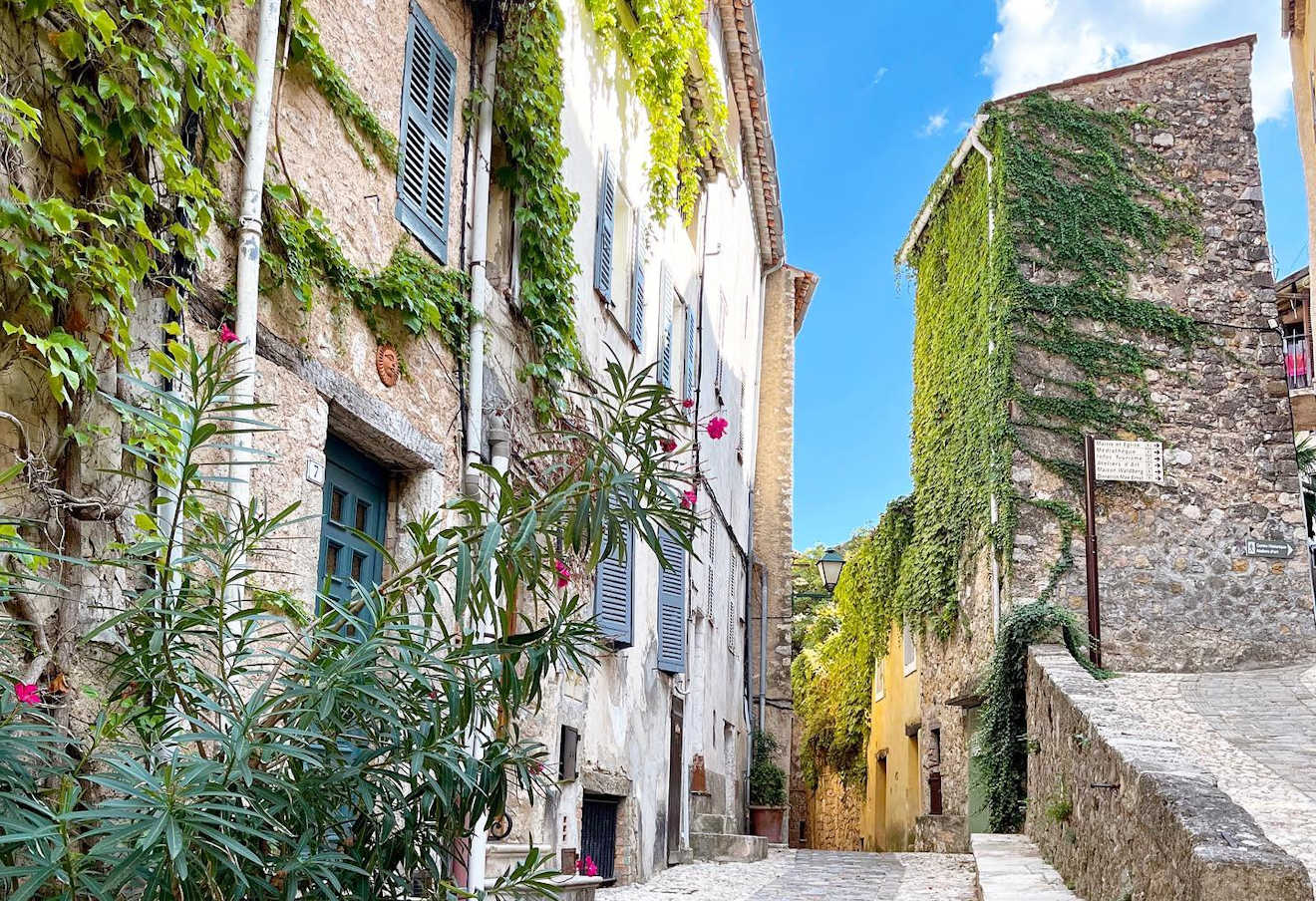 Seillans village Provence
Seillans village Provence
The website ExpatRA has also produced quite a long list of the best places to live in France. For some reason, most of the places seem to be based in the South of France: Toulouse, Bordeaux, Pau, the Languedoc, Aix-en-Provence, Hyeres and the Var. They do also name-check Lyon, to be fair, but that is about as far North as they go. I will cover the Languedoc and Aix-en-Provence below, but I would like to single out Hyeres and the Var.
Hyères never really occurred to me as a place to consider and I don't really know why. I have driven through Hyères a couple of times and what I would say about it, is that it is certainly a well planned town. It is well-laid out and there is a tunnel that runs under the city centre, that means you can get from one side to the town to the other very quickly. But I don't really know much about the town at all (I was surprised to read that it rivals Amsterdam as a centre for cut flowers). But I do know that the countryside and coastline around Hyères is beautiful. Hyères is a decent sized town of around 55,000 people and it lies just 2km from the coast. There are 3 small islands just off the coas,t called the Golden Islands (Porquerolles Island, Port-Cros and the L'Île du Lévant) and I have been meaning to visit them for years. They are supposed to be absolutely stunning.
In terms of the Var, I am going to open a real can of worms here. I am herby admitting that I just don't get Provence. Yes, it has some beautiful villages and towns - the area in the north-east of Provence, around Salernes, Cotignac and the Gorges du Verdon is really beautiful, and the Luberon, especially the north-western part, around Gordes, Roussillon, Ménerbes and Mont Ventoux is equally as pretty, - but the central part of the Var in between Draguignan and Brignoles, I mean there is nothing there. Of course, the coastline of the Var in between Toulon to St Tropez and Sainte-Maxime is another world. There are some very pretty and interesting towns and villages here and there, such as Aix-en-Provence (obviously), Arles, St Remy de Provence, Barjols and L'Isle-sur-Sorgue. But the rest of it, I am not so sure about. I mean seriously, Salon de Provence? Chateaurenard? Manosque? Carpentras? - these are just dull working towns with no real interest. There is much more to do and see in the Languedoc and the property in the Var is just way over-priced.
SOURCE: ExpatRA Best Places to live in France
Movehub - Top 7 best areas in France to live
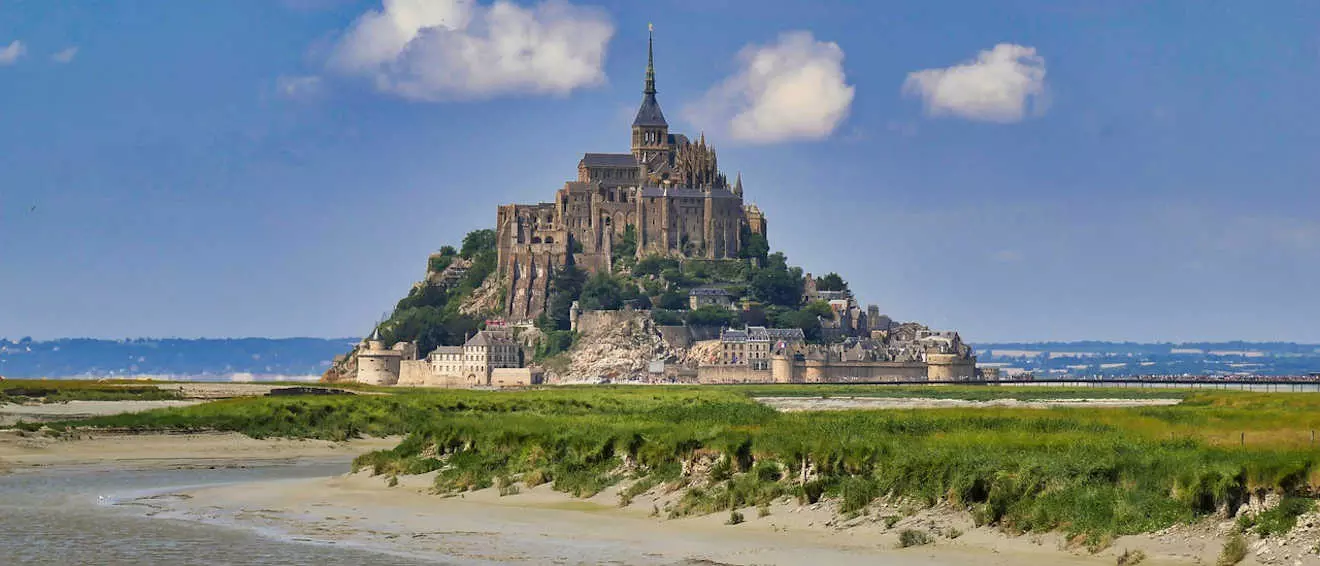 Mont St Michel, North French coast
Mont St Michel, North French coast
The international relocation company, Movehub, takes a slightly different approach and one which I will also try to follow. Rather than rank the places in France in order (using either subjective/objective criteria), they have simply categorised them according to the key selling feature.
#1 Paris - Best for nightlife
#2 Brittany - Best for affordability
#3 Lyon - Best for food and drink
#4 Montpellier - Best for families
#5 Luberon - Best for countryside
#6 Dordogne - Best for retirement
#7 Provence - Best for beaches
There are a number of issues and errors with this list. Firstly, it states that Bordeaux is France's 3rd largest city. This will come as a shock to Lyon, which actually is the 3rd biggest city in France. Bordeaux, is the 9th biggest city in France with just 254,436 inhabitants. Similarly, whilst I do agree that parts of Brittany are still quite affordable - for instance, the median house prices in the commune of Loudéac, which is right in the centre of Brittany, are €1,987 per m2 (January 2026) - property prices have been soaring in Brittany for the last 3-5 years. In Brest, on the northern coast, house prices have risen by +25% over the 5 year period up to January 2026. Similarly, in the capital, Rennes, the cost of apartments have soared by +22% over the last 5 years (making Rennes the 6th most expensive city in France to buy an apartment) and house prices are currently hovering around €5,000 per m2. SOURCE: L'Appourteur d'Immo
I would agree that the Luberon is a beautiful area of France, but equally, the Lozère region offers more dramatic scenery, as does the Ardèche and Auvergne. As for the claim that Provence has the best beaches in France, that is simply not true. With the odd exception (such as Le Lavandou), the beaches in the Var and Bouches-de-Rhone are small and normally packed out in the summer.
Summary: Survey results on best places in France to live
Overall, I think that a lot of these articles have just been written by hired writers with no real knowledge of France. I think that it is better to look at some of the more thorough research surveys and opinion polls. Luckily, there are 2 in-depth research studies that have recently been published. Both of these analyse the best villages, towns and cities in France against a range of quality of life measures.
Association des villes et villages - best towns & cities in France to live
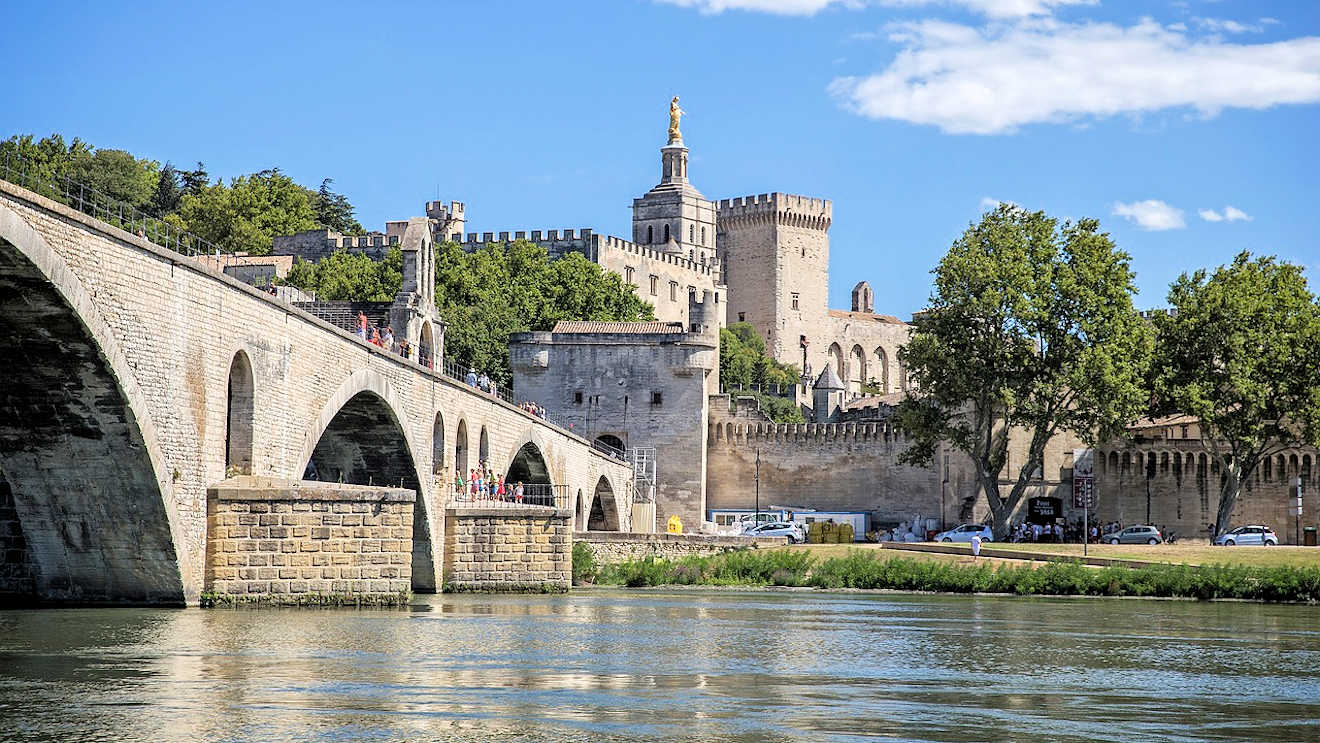 The city of Avignon, South France
The city of Avignon, South France
By far the most comprehensive study undertaken to find the best towns and cities to live in France, has been produced by the French organisation, L'association des villes et villages. This research project studied over 34,000 different villages, towns and cities in France and assessed them against 182 different criteria. The study took over 2 years to complete and investigated everything from Quality of Life factors, to local healthcare, education, sports facilities, shopping and support for citizens who are in need of help. So for example in the Quality of Life category, the survey considered over 70 different factors such as
- the number of hotels with a 4 or 5 star rating
- the level of unemployment
- the number of new businesses created
- water quality
- percentage of land given over to parks, communal squares, green spaces
- ratio of home owners to rental property
- number and range of cultural organisations
- local rates of pollution
The initial research was first published in 2023 and was recently updated in 2025. The research divided its findings into categories covering smaller villages, larger towns, coastal resorts and different geographical regions. We draw heavily on the results of this research for our own list of the 10 best places to live in France. But there are some notable towns and places included in this survey, that didn't make it onto our list (and therefore may be worth having a look at). These include:
- Le Mans - a large town in the Loire valley (with 140,00 inhabitant) and the location of the famous 24 hour motor race. The town was placed #5 in the list of best towns in France.
- Bayonne - a city on the Atlantic coast in South West France, which includes the resort of Biarritz and voted the 2nd best place to live in France.
- Strasbourg - the 8th largest city in France and placed number 12 in the list of cities in France with the best quality of life.
- Avignon - the cultural capital of the South of France and once home to the Pope.
SOURCE: L'association des villes et villages
L'Express - top 10 cities in France to live
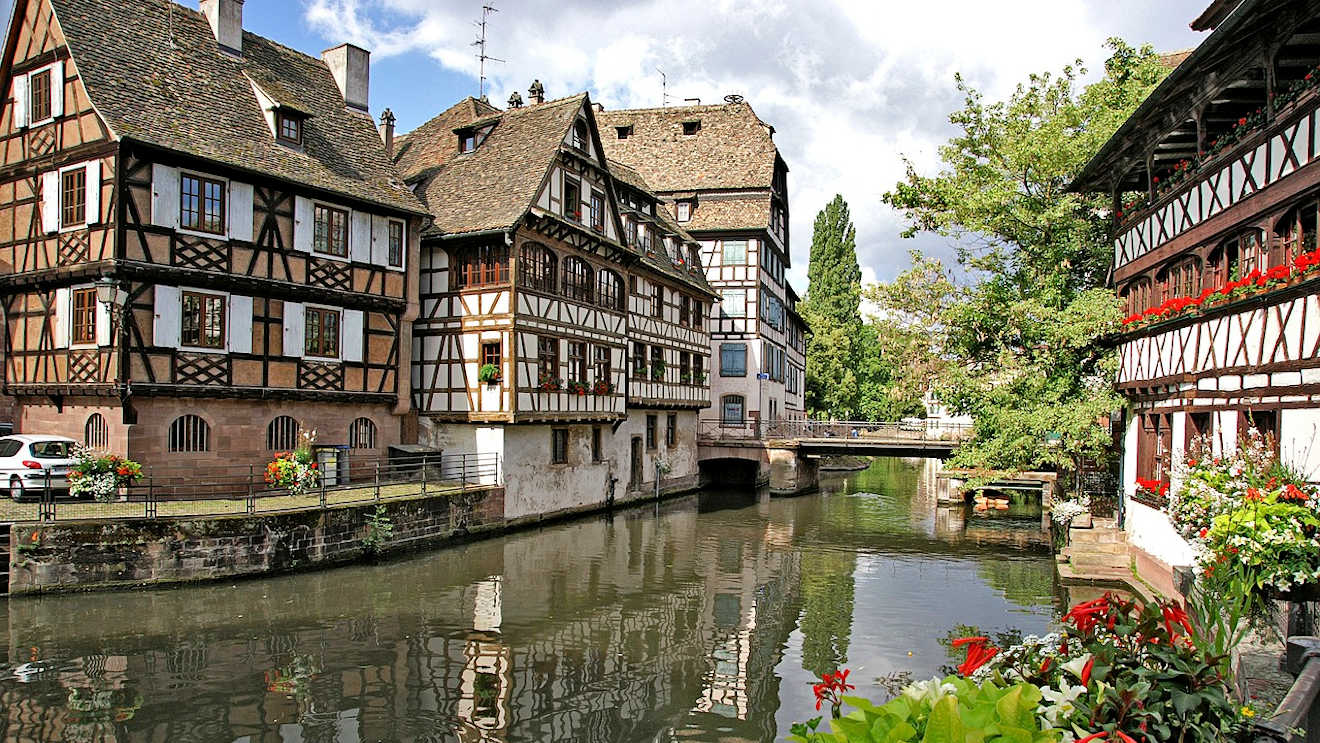 Strasbourg North East France
Strasbourg North East France
Whilst I feel that the above research is the most comprehensive list of the best towns & cities to live in France, I also think that it has thrown up some surprising results. Another in-depth study produced by the French magazine, L'Express, provides a more straightforward list. Certainly, when I have discussed this with our French friends there has been less raising of eyebrows.
The 2024 list of Best French cities to live in, according to L'Express, is as follows:
- #1 Nantes - strong job market, good transport and affordable housing
- #2 Rennes - second best city for work and noted for its vibrant cultural scene and green spaces.
- #3 Angers - a human-sized city with high-end healthcare and reasonable house prices.
- #4 Clermont Ferrand - noted for its natural surroundings and strong cultural scene.
- #5 Brest - cheap living costs, quick TGV connection to Paris, great leisure activities.
- #6 Limoges - peaceful living, affordable accommodation and clean air.
- #7 Dijon - high-quality university, cultural and medical facilities, meticulous urban planning and superior wine and gastronomy.
- #8 Montpellier - dynamic fast-growing city, with sunshine, festivals, beaches and a Latin temperament.
- #9 Caen - affordable accommodation, high rate of commercial activity.
- #10 Strasbourg - economic dynamism, 93% of inhabitants of Strasbourg live within 300 metres of a green space.
10 best places to live in France in 2026
The following list of places to live in France is based on my own personal observations from traveling round France for the last 20 years, some valuable input from our French friends, extensive background reading and a synthesis of the main research on quality of life measures.
1. Most beautiful place in France to live: Annecy
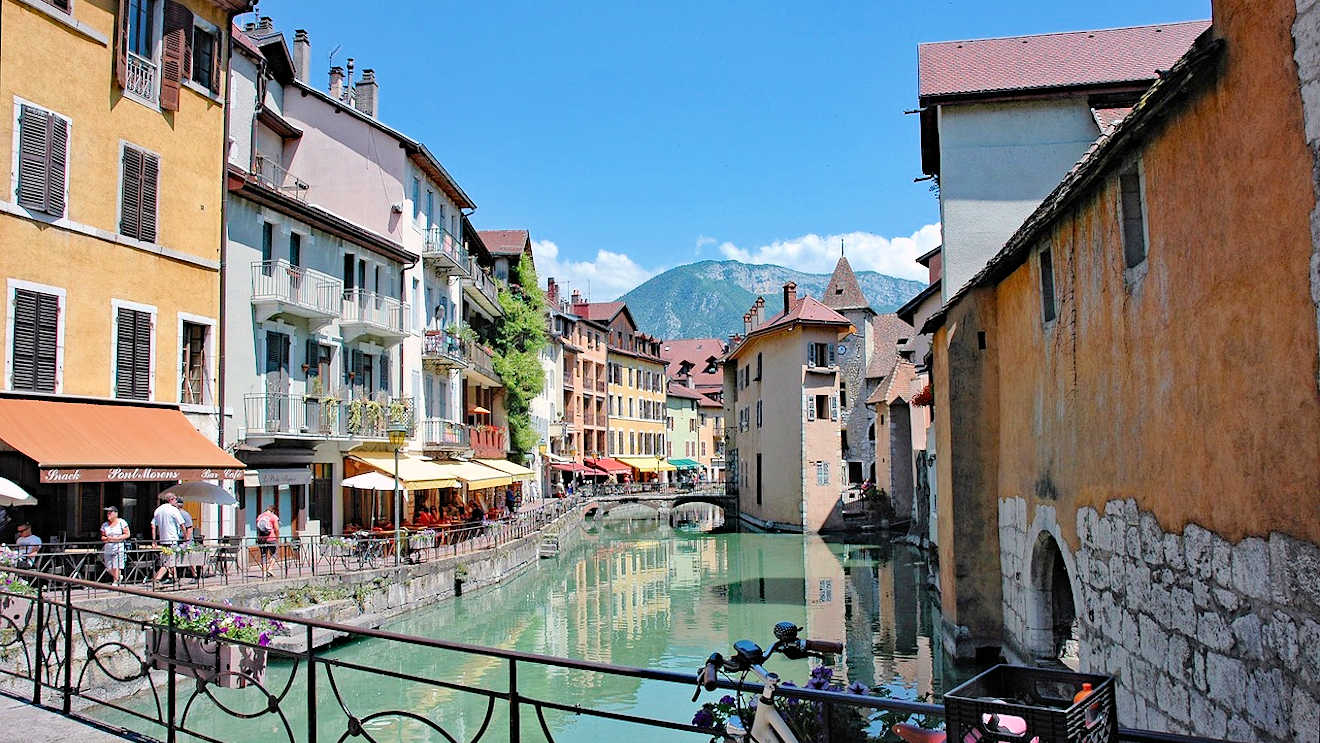 Annecy, Haute-Savoie department
Annecy, Haute-Savoie department
The stunning Alpine town of Annecy, is a truly beautiful place to live. Located on the shores of the Lac d'Annecy, with its famous clear turquoise waters, the town lies 35 km south of Geneva and 1 hour 30 mins east from Lyon. The town is surrounded by beautiful mountains, snow capped for most of the year.
Following a 2 year study by the L'association des villes et villages, Annecy came out as the #5 place to live in the whole of France. Annecy was also voted #7 in the 2024 list of the Best cities to live in France according to L'Express magazine.
Annecy has a population of 50,000 people. Its proximity to Geneva, means that a large proportion of the population can cross into Switzerland on a daily basis and enjoy the high wages from Swiss employment, but the lower living costs of living in France. Geneva also provides the nearest international airport, just 40 mins drive.
Annecy is quite a compact town, with limited building land around it. The result of this is that from the historic centre of the town you can quickly reach the lakefront and the mountains. The Lac d'Annecy is the second largest lake in France and has the purest water quality in the whole of Europe.
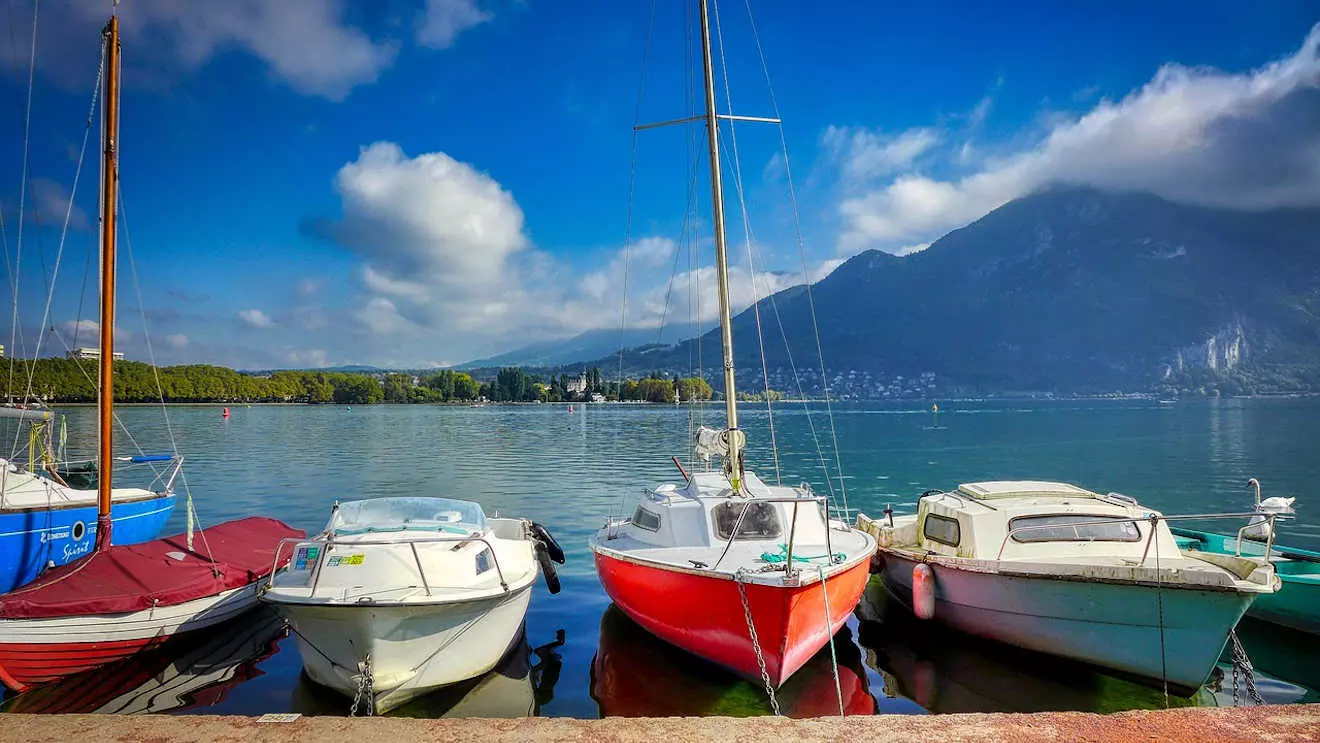 Lac d'Annecy
Lac d'Annecy
Annecy was also the home of the first Carrefour supermarket in France. This global supermarket chain, opened the doors to its first convenience store in Annecy in January 1958 (SOURCE: Escapes Annecy). The town is also home to Salomon an International sports equipment manufacturer and the Engineering company, SNR Roulements. The Université de Savoie has a large campus in Annecy, with over 4,500 students. Annecy also draws a significant portion of its income from tourism.
Annecy features a number of popular festivals throughout the year, including
- Venetian carnival in March
- International Animated Film Festival in June
- Fête du Lac in August (one of Europe's biggest fireworks displays)
- Italian Film Festival in September
- Christmas market in December.
Annecy is within easy reach of some of the best ski resorts in Europe (see Les 3 Vallées ski station). Also, its position on the lake provides a range of sailing and water sports activities. The paths and parkland around the lake also offers good trails for walkers, joggers and cyclists (visit www.leanicoise.com for more ideas on great walks in the area). In summer months there's even a bus service which transports mountain bikers to the nearby winter sports area of Le Semnoz for a 20km descent back to the town.
The one downside of Annecy is the high property prices. The average house price is €5,650 per m2, which compared to the regional average in the Haute-Savoie department of €4,256 per m², shows you just how expensive the town can be. The website Cost of Live rates Annecy as "very affordable" based on an assumption of employment in Switzerland. With an average monthly net salary of €4,891 (in Geneva) and an average rent in Annecy of €1,026 per month (1 bed apartment), it calculates that the average monthly cost of living for Annecy is €1,506 (covering House Rent + Food shopping + Restaurants + Utilities + Transportation + Entertainment).
2. Best place to live in France with kids: La Rochelle
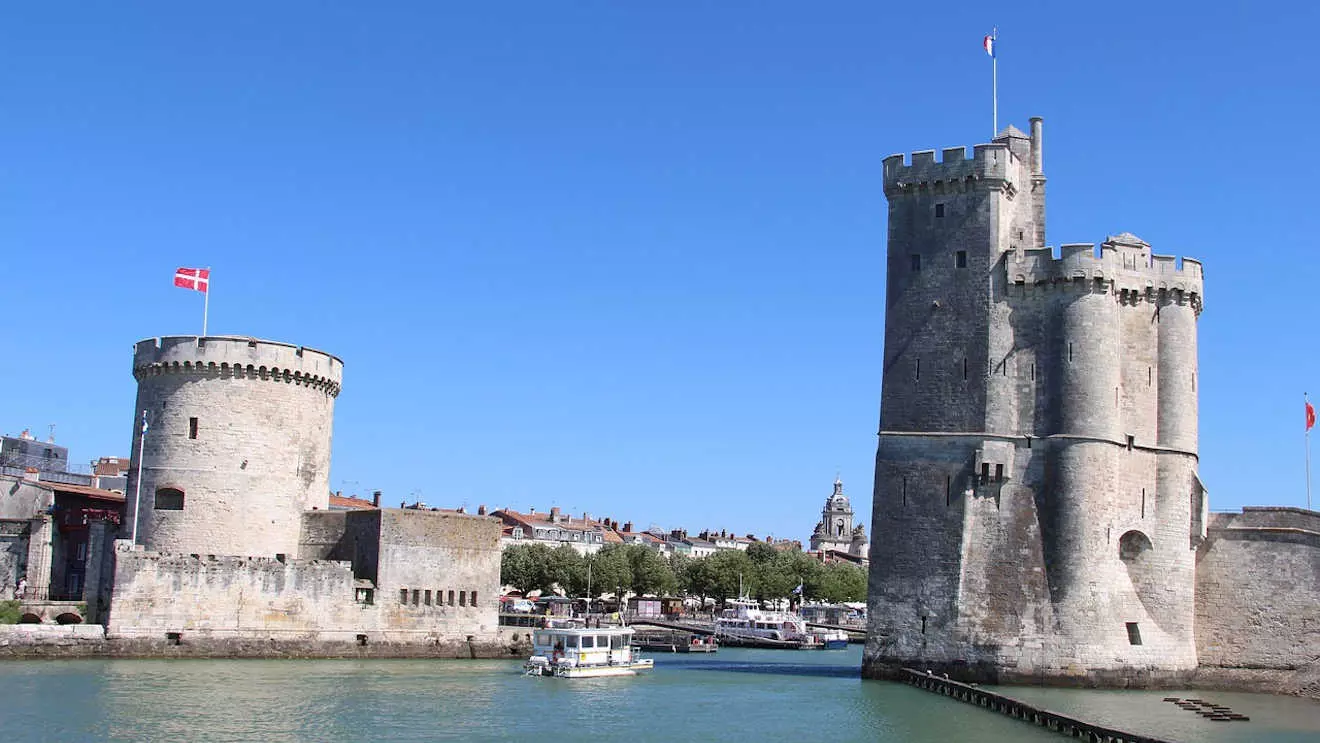 La Rochelle Western France
La Rochelle Western France
La Rochelle was also a contender for the category above. I first visited the city over 20 years ago and I was blown away by how beautiful it was. We recently went back to La Rochelle (in November 2025) and I was still very impressed by the city. I just found it a very safe and friendly place and the main harbour area is very beautiful, with cobbled streets and old stone buildings
La Rochelle is an historic port on the Atlantic coast in the Charente-Maritime department. La Rochelle has a reputation as a lively all-year-round place, with a strong cultural identity and good range of leisure facilities (on account of its tourism trade). It is a decent sized town with a population of 75,400. La Rochelle benefits from a high-speed rail link to Paris, an international airport, good schools and universities, and a well-respected network of hospitals and healthcare facilities.
Nearby to La Rochelle, you have some great beaches on the Atlantic coast. You also have the beautiful natural island of Île de Ré, just off the coast from La Rochelle, reputedly one of the most expensive places in France to buy waterfront property.
La Rochelle was voted #8 in the 2025 list of best large towns in France, in the in-depth survey provided by L'association des villes et villages.
The property prices in La Rochelle are not cheap compared to the surrounding area. Average house prices in the city are €4,526 per m2 compared to €2,829 per m2 in the Charente-Maritime department generally. But in comparison to the rest of France, that is still relatively cheap.
3. Most affordable places to live in France: Poitiers
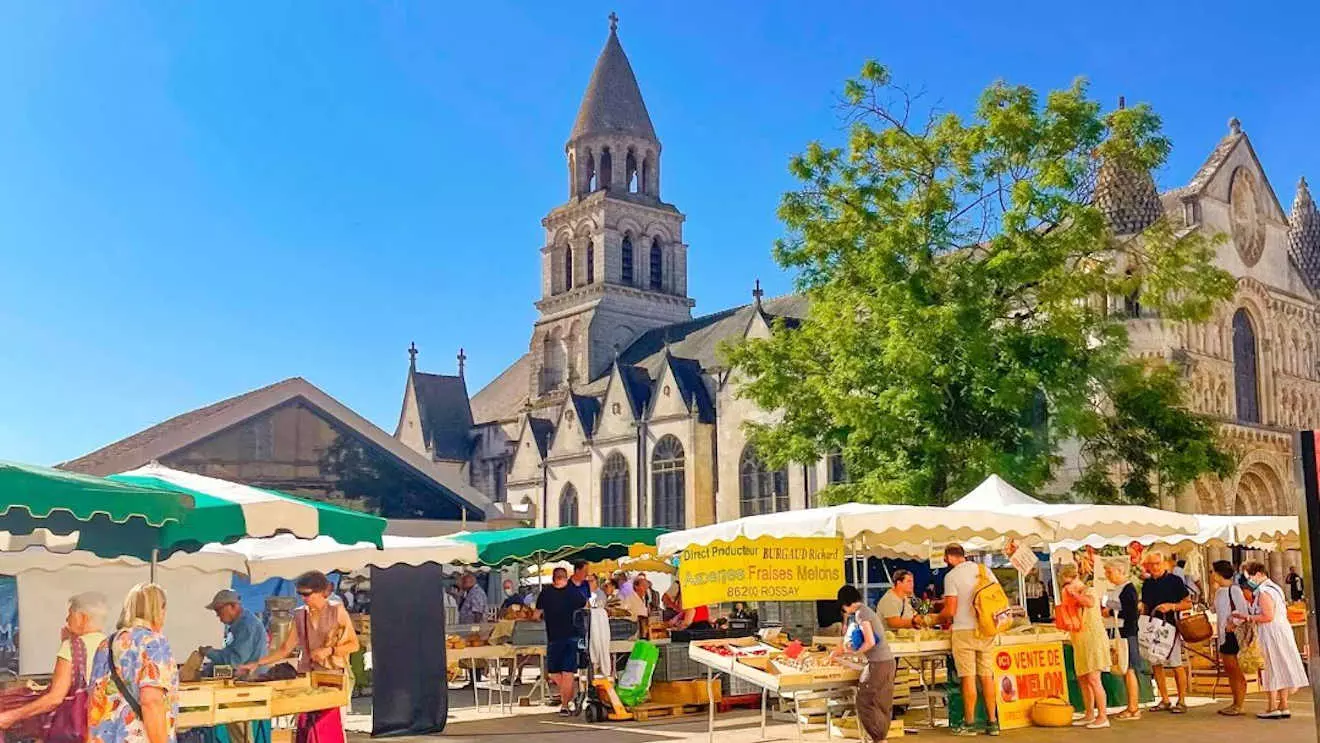 Poitiers, Central France
Poitiers, Central France
The popular university town of Poitiers in Central France, is currently in the midst of a property boom. House prices have been increasing quite dramatically over the last 5 years, as more and more people leave the big cities and search for cheaper provincial cities in which to live. House prices in Poitiers rose by +12.3% over the last 5 years, but even so, the median sale price for a 3 bed house was just €129,900. Similarly, the prices of apartments in the town increased by a staggering 15.6% in recent years, to stand at €2,190 per m2. [SOURCE: Efficity
The website Cost of Live rates Poitiers as "very affordable". With an average monthly net salary of €2,006 and an average rent of €450 per month (1 bed apartment), it calculates that the average monthly cost of living is just €908 (covering House Rent + Food shopping + Restaurants + Utilities + Transportation + Entertainment).
But Poitiers is not all about cheap housing and affordable cost of living. The centre of Poitiers is a very pleasant place to stroll around. It has some beautiful buildings. The narrow cobbled streets of the historic medieval quarter are very pretty. The central shopping district on the Grand Rue has some lovely shops and boutiques.
The University of Poitiers is one of the oldest in France, being founded in 1431. The town has over 27,000 students and 1 in 4 people in the city is a student. Over 30% of the population is under 30 years old. Poitiers attracts over 4,000 foreign students every year and the law degree at the University of Poitiers is considered to be one of the best in France. Poitiers is also home to two prominent business schools (France Business School (FBS) and the Institut d'Administration des Entreprises de Poitiers) and two elite Engineering schools.
Poitiers is located in the Nouvelle-Aquitaine region in Central Western France, 1 hour 30 mins to the Atlantic coast at nearby La Rochelle. There is a direct TGV train service from Poitiers to Paris (2 hours) and Bordeaux (1 hour 17 mins). The popular Futuroscope theme park is located just north of the city and this is the 9th most popular tourist attraction in France, receiving 1,850,000 visitors per year. Many festivals are held in Poitiers throughout the year, including an International film festival held in December; Festival A Corps - a large festival of Dance, which takes place every April; Bruisme -a Jazz festival at various venues throughout the city in late June/early July; and Les Expressifs de Poitiers - a large street festival held in October
Poitiers reached #2 in the list of the of Best cities to live in France and was described by L'Express magazine as:
". . . A paradise for young people who benefit from accommodation among the cheapest in France. With its theatres, its cinemas and its street festivals, the city offers a great quality of life and complete safety . . ."
4. Best area in South France to live: Hérault
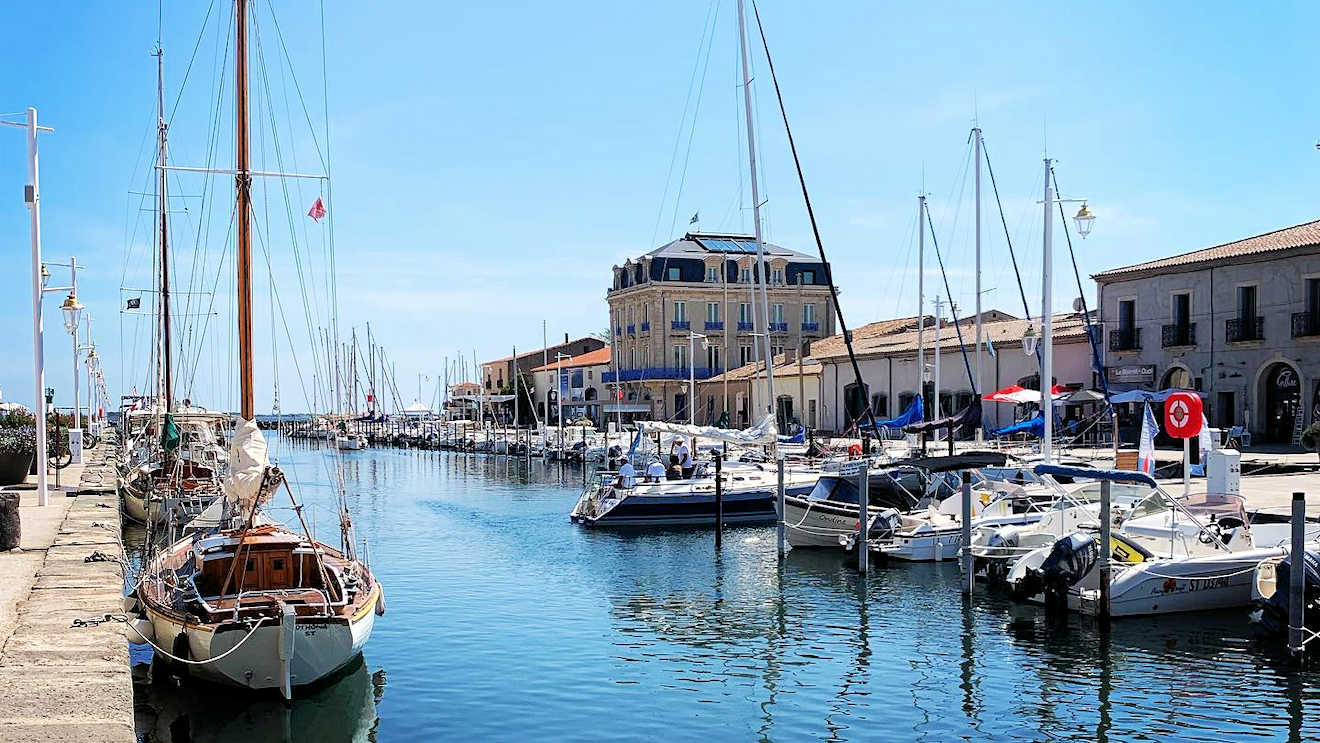 Marseillan harbour, Herault, South France
Marseillan harbour, Herault, South France
I have picked out the Herault department in the Languedoc as the best place to live in the South of France. This was mainly through a process of elimination:
- Unless you have deep pockets, then the Cote d'Azur is going to be out of your league and the traffic will drive you mad.
- Parts of Provence are very beautiful, but central Provence (with the exception of Aix-en-Provence) is pretty empty and not very interesting. You also have the issue of the Mistral winds in the winter which can knock you sideways and make life pretty miserable.
- The Gard department, just above Herault, is a beautiful area, but it is also quite rural. Apart from the city of Nimes and the large town of Alès, the rest of the department is made up of villages and small towns.
- The Aude department is one of the poorest areas of Southern France and in my humble opinion, pretty lifeless.
- The Pyrenees-Orientales department has some interesting parts (like Collioure and Perpignan) but the rest is pretty dull.
So we are left with the Herault as providing the best quality of life in the South of France.
The Herault department runs along the Mediterranean coast, has a large coastal plain which features the largest wine region in France and it has an impressive range of hills further inland. Like the rest of the South of France, it enjoys a warm Mediterranean climate, but isn't as affected by strong winds. The Herault is a very diverse area, with dynamic cities, picturesque villages (3 of which are officially listed as the 150 Most Beautiful Villages in France), beautiful rivers & gorges, lovely harbour towns and 87 kms of superb sandy beaches. The Herault has 540 listed historical monuments and the department is home to 3 UNESCO World Heritage Sites. In Saint-Guilhem-les-Desert and the Cirque de Navacelles it also has 2 of the Grande Sites de France.
The Herault is sports mad. Rugby is like a second religion in Beziers. Montpellier has one of the best Handball teams in Europe and its football team (to everyone's surprise) recently won the French league. The small town of Lattes has one of the best women's basketball teams in France and the professional volleyball team in Sete has remained in the top division in France for 41 consecutive seasons.
A lot of my friends here in France are big into cycling. They reckon that the Herault has the best cycling routes in Europe. It is because the scenery can change so quickly. You can go from vineyards to mountains in the space of a few kilometres.
The Herault is also home to some of the best vineyards in Southern France. I am sure that you will all have come across the crisp white wine of Picpoul de Pinet. But you must also search out the beautiful rosé and red wines from Faugeres, Pic St Loup and Saint Chinian.
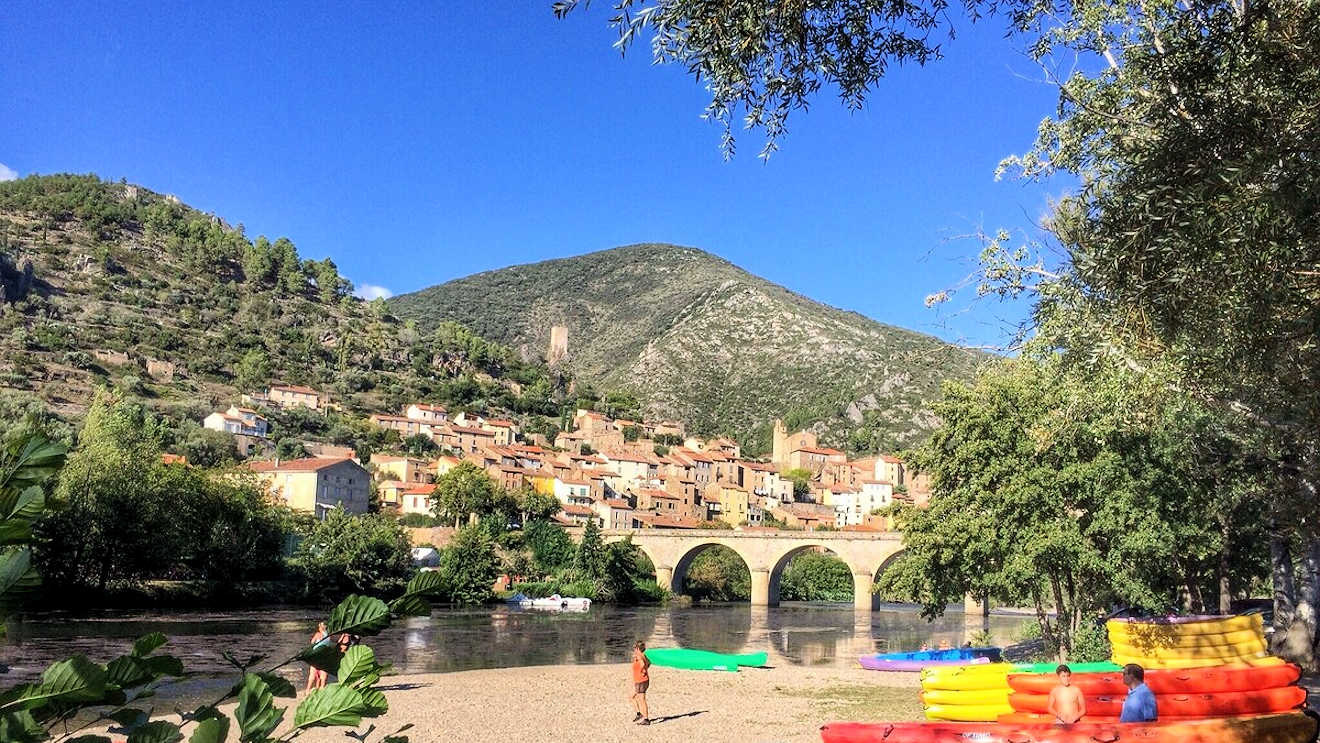 Roquebrun, Haut Languedoc National Park, Herault, South France
Roquebrun, Haut Languedoc National Park, Herault, South France
The Herault has some wonderful places to live in:
- Pezenas is without doubt the most beautiful town in Languedoc, if not the whole of South France. The best time to visit Pezenas is in the height of summer during the regular Estivale when all the shops in Pezenas stay open late, local vineyards are selling their wine on the streets and the old town is buzzing with life. Pezenas is also famous for having one of the largest weekly markets in the South of France.
- Marseillan is a delightful harbour town located on a salt water lake separated from the Mediterranean sea by a thin strip of beach. The town is full of life all year around. You can taste fresh oysters and mussels pulled straight from the lake at the inexpensive Cabane restaurants over-looking the Etang du Thau. Marseillan has been the home of the Noilly Pratt distillery for over 200 years and this smooth vermouth drink is still the staple ingredient of a dry Martini. Today the distillery houses a wonderful cocktail bar and museum.
- Like Marseillan, Meze is a charming harbour town which looks out over the Etang du Thau towards the bustling town of Sete. Meze has a lovely sandy beach and numerous sea food restaurants around the port
- Sete is a bustling port town on the Mediterranean coast, built around a number of canals. It is a real party town, with numerous festivals taking place throughout the year. The best time to visit Sete is on a Sunday during the summer, when you can witness one of the most bizarre sporting events in the world. If you have never seen Water Jousting, then you are in for a treat.
- Montpellier is a really dynamic city, which has grown fast over the last 40 years. The city has an international airport, new TGV train station and it is bisected by the A9 motorway which runs down from Lyon to the Spanish border. The city is home to 3 universities and a booming tech sector. The beaches at Palavas and Le Grande Motte are just 10km from the centre of Montpellier.
- The town of Beziers is officially recognised as the oldest town in France. The city is staging a bit of a comeback and a lot of property investors are piling into the town. Beziers has everything going for it: a lovely old town, the Mediterranean beaches are 10km from the centre, there is a TGV train station and an international airport, two motorways (the A9 and A75) converge in Beziers and it is surrounded by the largest wine region in the whole of France.
5. Best place to retire in France: Limoges
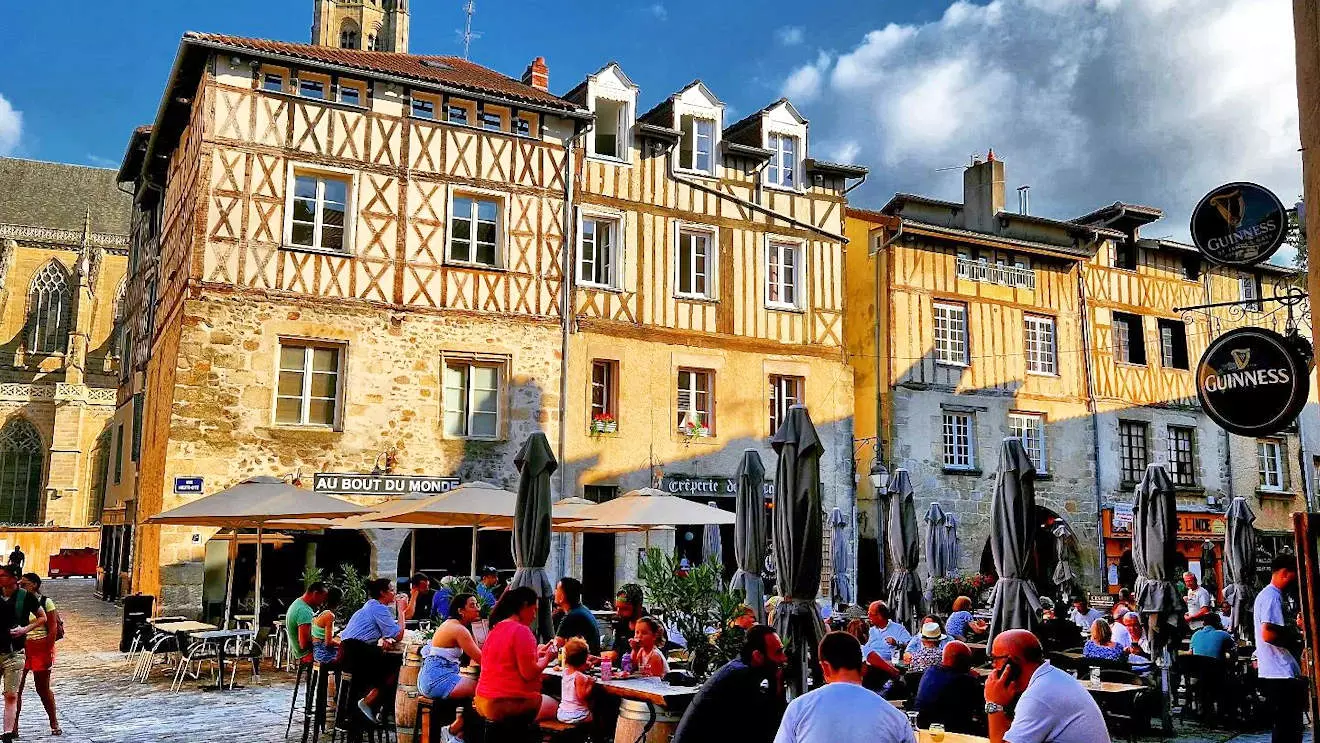 Limoges historic centre
Limoges historic centre
I often feel that with a lot of these surveys and articles, when they get a pretty town or city, where there isn't too much going on (or where there is a declining younger population), they think, right this place is perfect for retired people. They can get dressed-up in their beige clothes, shuffle around the town, play golf as much as they want and stare out of the window.
But all the retired people I know here in France are busier now than when they were working. None of them would describe the highlight of their week as a trip to the golf club. They are out and about visiting places, going on gruelling cycling routes, running Cancer support groups, getting involved in Environmental campaigns. Also a lot of them are still working running part-time businesses to support their pensions. Drop them in the middle of the Haute-Garonne or the Arriège and they would go stir-crazy within a few months.
So, I would generally look for these 4 things in a good retirement destination:
- affordable housing - to enable a down-sizing in property values (but not necessarily the space)
- good transport links - to enable visits back to see family (and have them over to stay)
- a good range of things to do and places to visit - festivals, markets, great countryside, museums, art galleries
- an environment that promotes an outdoor life - so decent climate, clean air, plenty of green spaces and squares, cycle lanes, a café culture, etc
Yes hospitals and healthcare is important, but that only applies if someone gets sick and hopefully people will live a long healthy retirement. Plus, in France good healthcare is pretty much a given. Also, a lot of the articles on retirement destinations in France mention the high density of ex-Pats as an attraction. Bloody hell, I couldn't think of anything worse. You are just creating enclaves of grey haired British people, Swedes and Germans. That isn't healthy. Getting out and about with French people, learning a new language, fully integrating yourself in a community is what will keep you young, mentally fit and healthy.
Finally, whilst affordable property prices is one important factor, it should not be the sole decision point. After all, if we just wanted to find the cheapest property prices we would all be off to the Tarn department. There is a good reason why property in some locations is really cheap. It is either because there is 'naff all to do here', or the population is dwindling, or basically it is not a very nice place. So sometimes you have to balance affordability with adjusting your property wish list criteria.
So with this all in mind. I am nominating the city of Limoges as the best retirement destination in France. I did consider some other locations, but I eventually discounted them:
- Bordeaux - too expensive
- Dordogne - too boring
- Pau - a lot of the surveys promote the city as a retirement destination, but I m not sure that there is enough to do here.
The city of Limoges is located in the Limousin region of Central France. It featured at #4 on the Top 10 list of best cities to live in France, it also scored highly in terms of quality of life on the Association Villes et Villages in-depth research (coming in at the 15th best large French town).
L'Express magazine nominated Limoges as a great place to live in France because it offers:
". . . a peaceful living environment with the purest air quality in France, it is a lively university town and there is a rich and varied theatre and musical cultural programme . . ."
With just 208,000 inhabitants, Limoges is a small city, the 28th largest in France. Around a third of the population is under 30 years old.
Throughout its history, Limoges has been known for producing ceramics and porcelain, as well as oak barrels (used for storing Cognac), both of which made the city very wealthy. Today, Limoges is home to some of France's largest companies, including Legrand (electrical component manufacturer), Renault Trucks, Valeo, Schneider Electric and Haviland (a manufacturer of luxury porcelain goods). The rate of unemployment in Limoges is below the national average (7.10% in 2022)
Limoges has a very famous basketball team (CPS Limoges), who play at the futuristic looking Stade de Beaublanc. They are the only French team who have won the European Basketball League. The city also has a decent Handball team and a not very good football team.
The climate in Limoges is pretty decent. It gets warm in the summer, but not baking hot (a nice 24°C/75°F). In the winter, it rarely drops below zero, with day time temperatures around 7°C/48°F. The only downside is that the winter months can be wet, especially in November.
In terms of travel, Limoges has a TGV railway (with direct connections to Paris and Toulouse). The A20 motorway connects Limoges with Orléans and Paris to the north, and Cahors, Montauban and Toulouse to the south. Limoges airport, has regular flights to the UK (Bristol, Stansted, Manchester, Leeds-Bradford and Nottingham). In the centre of Limoges there is a quite well-developed public transport network (including one of the few remaining trolleybuses in France).
The area around Limoges is great for visiting grandchildren. Apart from the fantastic Futuroscope theme park, you also have the huge indoor pools at L'Aquapolis, a good aquarium, the Reynou safari park and the Limousine Park.
The Michelin travel guide summarises the best features of Limoges
" . . . it is a lively city, dotted with attractive boutiques which you can explore as you stroll through the streets and along the banks of the river Vienne . . ."
6. Cheapest place to live France: Châteauxroux
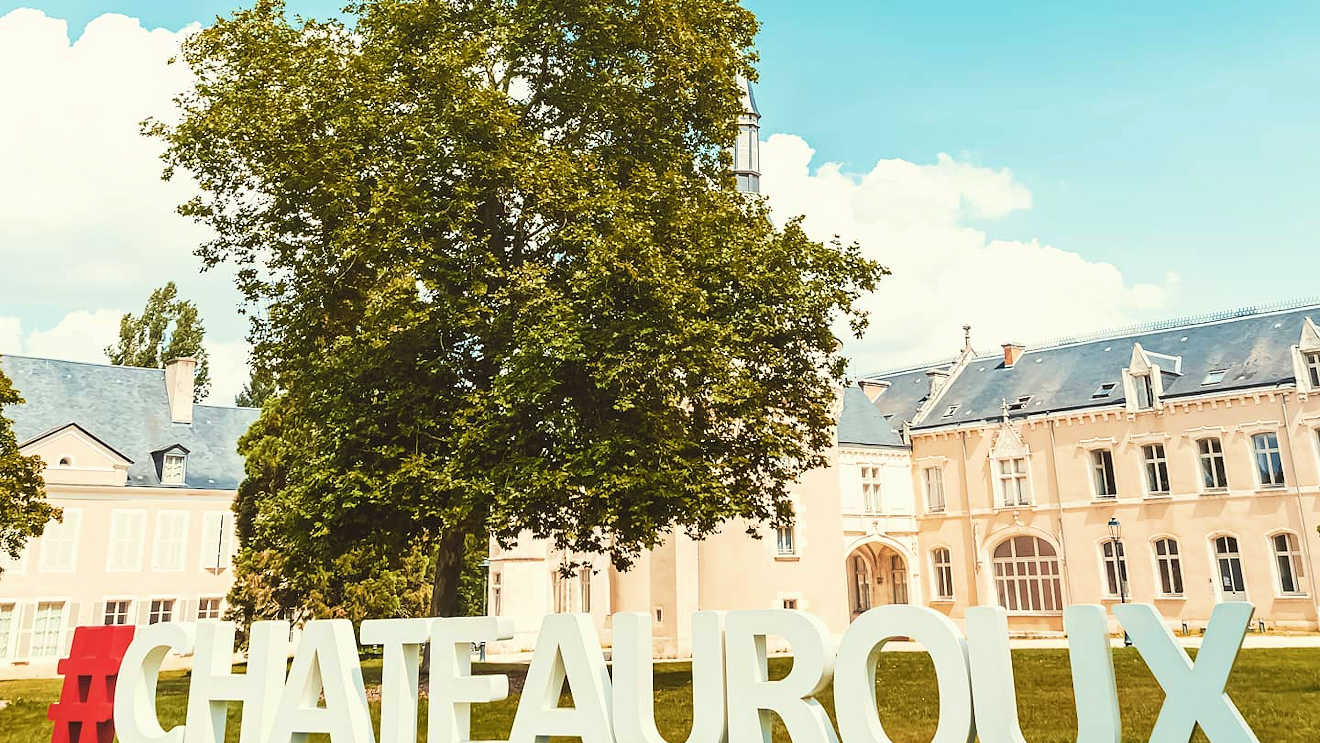 Chateauroux, Indre department, France
Chateauroux, Indre department, France
The cheapest place to buy a property in France in 2025 was the town of Châteauroux, just below the Loire valley. Châteauroux is the capital on the Indre department and has a population of 43,000. It is quite a pretty place, with many old Mansion houses in the centre and many Petit Chateaux (small country estates) in the surrounding countryside. Châteauroux has a TGV railway station with train services up to Paris and Orléans and down to Limoges and Toulouse. The A20 motorway connects Châteauroux with Brive-la-Gaillarde and Toulouse.
The median sales price of property in Châteauroux was just €131,000 during the 12 month period to Q3 2025. This is perhaps not surprising given this department has seen a 2.8% decline in population since 2012.
Most of the Indre department is fairly flat agricultural land. The local economy is heavily reliant on agriculture. I have to be honest, I have lived in France for 15 years and I have never met a single person from Indre or ever heard it mentioned on TV. I think that it is one of those places like Northampton in the UK, Wisconsin in USA or Adelaide in Australia - where nothing much happens. But over the last 5 years, the cheap house prices in Indre have seen a recent influx of buyers purchasing holiday homes. Around 10% of the housing stock in the department, comprises second homes.
7. Best places to study in France: Rennes
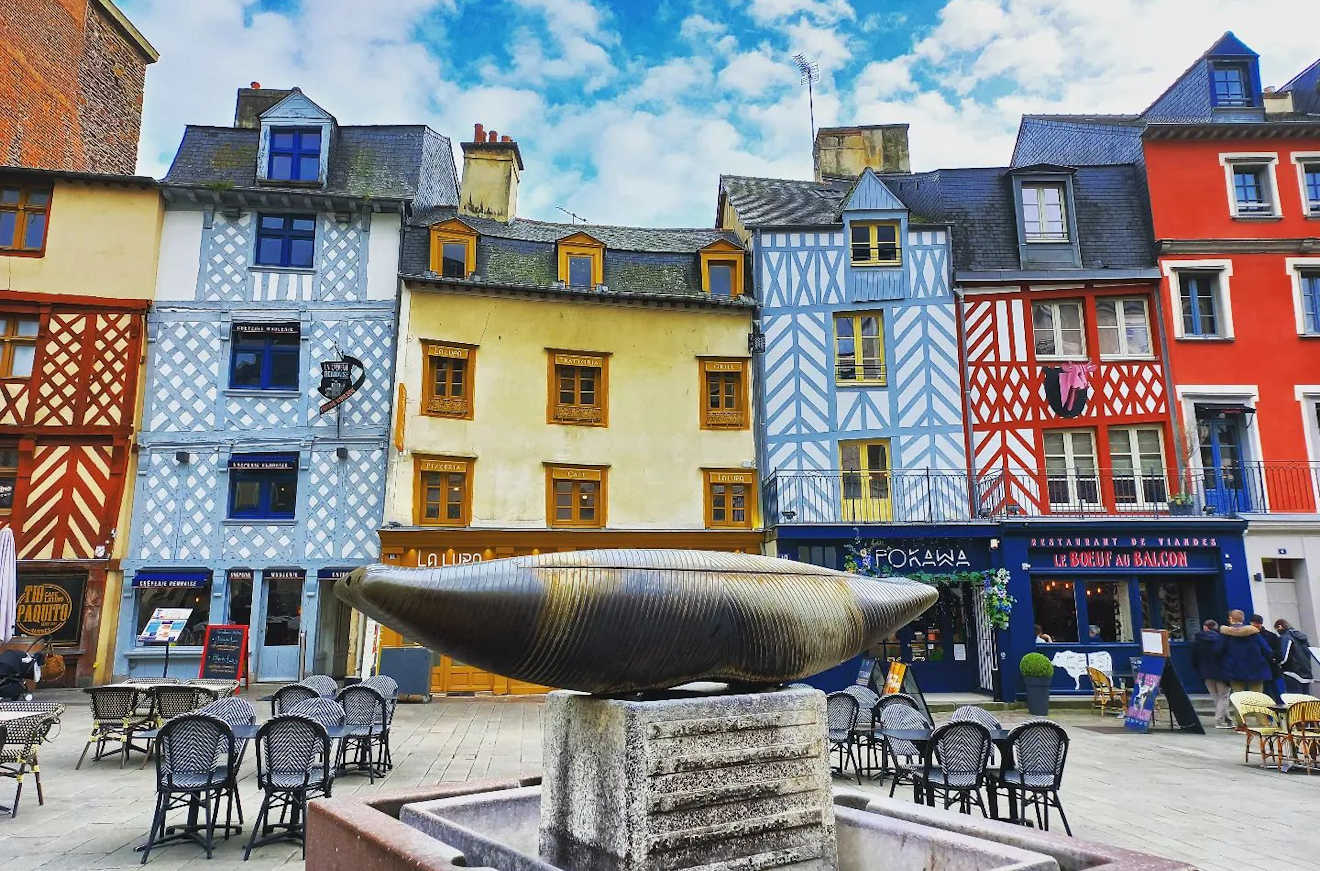 Rennes, Brittany
Rennes, Brittany
The city of Rennes which is the capital of Brittany in the far North West corner of France, reached #9 on the list of Best cities to live in France and #2 on the list of Best French cities to work in.
Rennes bills itself as one of the greenest cities in France - both in terms of its number of gardens and parks, as well as its advanced network of electric public transport and cycle lanes. Rennes is part of the FabCity movement, which aims for zero carbon zero emissions by 2054, preserving biodiversity and ecological cycles and becoming self-sufficient in natural resources.
According to INSEE, in the last 3 years, the population of Rennes has increased by an average of +7.6% each year, bringing the total population of the city's catchment area to 438,865 people. However, the city itself remains quite compact and easy to walk around. Rennes is only the 11th biggest city in France and it retains a small town feel. The centre of Rennes is very beautiful, with plenty of half-timbered buildings and lots of squares with pavement restaurants.
Rennes enjoys a dry, mild climate. Its annual rainfall is below the national average and during the winter temperatures are relatively mild on account of the Gulf Stream. During the summer the city enjoys bright sunny days, although it is rare for temperatures to exceed 25°C/75°F.
L'Express described Rennes as:
" . . . a city that has been on the rise for several years. Its economic and cultural dynamism, young population and green urban projects and shared gardens are legion . . ."
Rennes has two universities and over 25 colleges, including a highly regarded teaching hospital (Rennes University Hospital). In total there are 63,000 students in Rennes, one of the highest densities in any French city. The universities in Rennes also attract a high number of foreign students (11,187 in 2024, representing 17% of the total).
In a survey conducted by L'Etudiant-L'Express, Rennes was ranked 2nd out of 43 French university cities as the best place to study. The large student population gives the city a youthful and vibrant feel. There is also a strong cultural side to Rennes. There is an Opera house, Museum of Fine Arts (with strong links to the celebrated L'École européenne supérieure d'art de Bretagne, one of France's Grande Écoles for the arts) and a number of theatres.
Rennes hosts a number of large-scale festivals throughout the year. These include:
- Rennes Traveling Festival - an international film festival held in February
- La Route du Rock - a rock festival held in Rennes and Saint-Malo the end of February and beginning of March
- Made festival - a house and techno music festival held in May
- Les Tombées de la nuit -a street arts festival that takes place in July every year
- Festival de Maintenant - a festival showcasing the use of new technologies in music and the arts
- Festival Court Métrange- an international film festival for short films which takes place in October.
- Jazz à l'Oues, - a major Jazz festival which takes place in November each year in 22 venues across Rennes
- Les Rencontres Transmusicales - a contemporary music festival held in December.
Rennes may not feature too often in the articles on the best cities to live in France, but when you look at the really in-depth research, the city scores highly across a range of quality of life factors. Rennes was placed 4th out of 34,312 villages, towns and cities in the 2025 survey conducted by the L'association des villes et villages and as we have seen above, it regularly features in the top 5 of places to live, work and study in France.
Runner-up: Montpellier
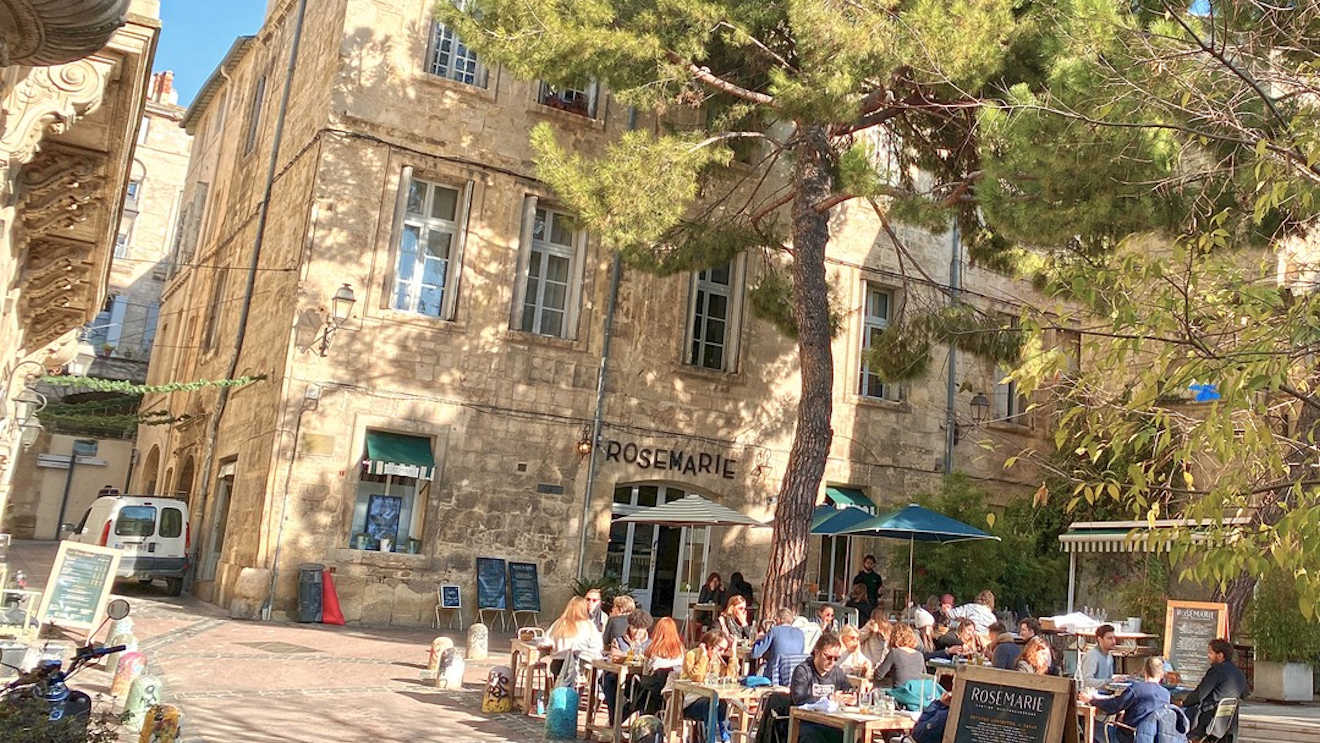 Montpellier South France
Montpellier South France
The city of Montpellier on the Mediterranean coast in South France is home to more than 70,000 students, making up more than 21% of the total population. In terms of the number and density of students, only Bologna in Italy can rival Montpellier as the largest European University town. Montpellier's Universities have a great reputation, with its Medical faculty being one of the most pre-eminent in France. Montpellier is one of the oldest university towns in Europe, with many of its schools and faculties dating back to the middle ages.
The Universities in Montpellier attract some of the highest numbers of foreign students in France, representing 19% of the total (nearly 15,600 students in 2024). Around 40% of the students in Montpellier come from outside the region.
Montpellier has two universities (University of Montpellier and University Paul Valéry) and a dozen Grandes Écoles (specialist higher education institutes which have an excellent reputation for teaching). Among the Grande Écoles in Montpellier are:
- The National School of Civil Aviation
- Montpellier Business School
- National Institute of Agronomic Studies
- Polytechnic School of Engineering
- National School of Architecture
- School of Fine Arts
- National School of Chemistry
The Université de Montpellier was ranked the 8th best University in France (after such illustrious colleges as the Sorbonne University in Paris and University of Strasbourg). SOURCE: World University Rankings
Montpellier also has a well-respected International School, Ecole privée Bilingue Internationale, accepting children from 5 to 18 years. The school is located in the northern suburb of Baillargues.
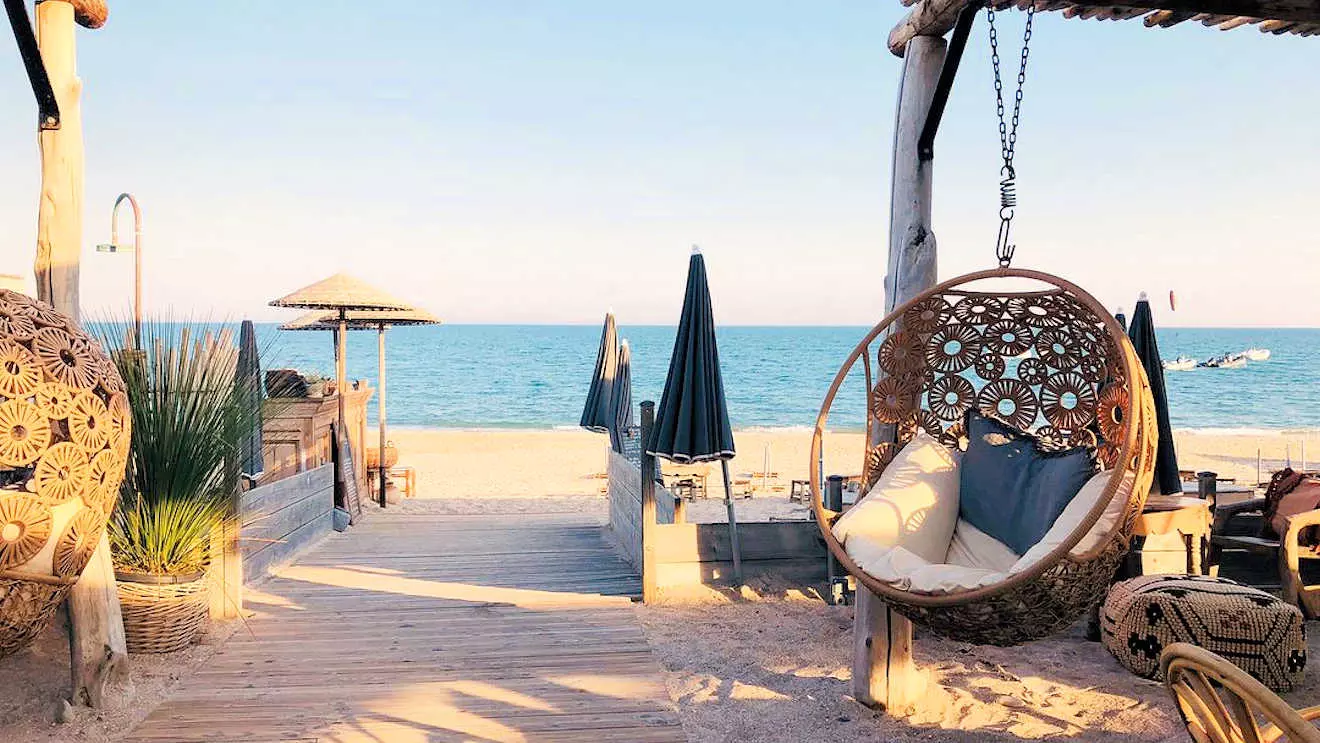 Montpellier beaches
Montpellier beaches
The key attractions of Montpellier are its proximity to the Mediterranean beaches (just 10 kms), its hot climate, beautiful historic centre dating back to 985 AD, excellent shopping and lively nightlife.
One of the drawbacks of Montpellier is the availability of affordable accommodation. In terms of rental accommodation, it is not uncommon for apartments to get snapped up within hours of being advertised. Property prices in and around Montpellier have continued to grow by +8% during 2020. The average house price in Montpellier in Q3 2021 stood at €390,000 (which was an increase of 13.2% for the year) and apartment prices increased by +4.9% in the 12 months to November 2021 to stand at an average of €3,100 per m2.
Although Montpellier can get congested with traffic, it has sought to develop its public transport network by expanding the local tram network. Montpellier has a brand new TGV train station on the outskirts of the city, an international airport and the A9 motorway passes right past the city.
Montpellier also has a significant bio-medical industry hub and is home to some of the biggest Tech companies. IBM has been based in Montpellier since the 1950s and the city is also the French headquarters of Dell. Other significant local companies include Vestas (the world's largest manufacturer of wind turbines); Asics, the Japanese sports equipment manufacturer; Sanofi (neuroscience and oncology centre), Alstom and Bausch & Lomb.
8. Best cities to work in France: Nantes
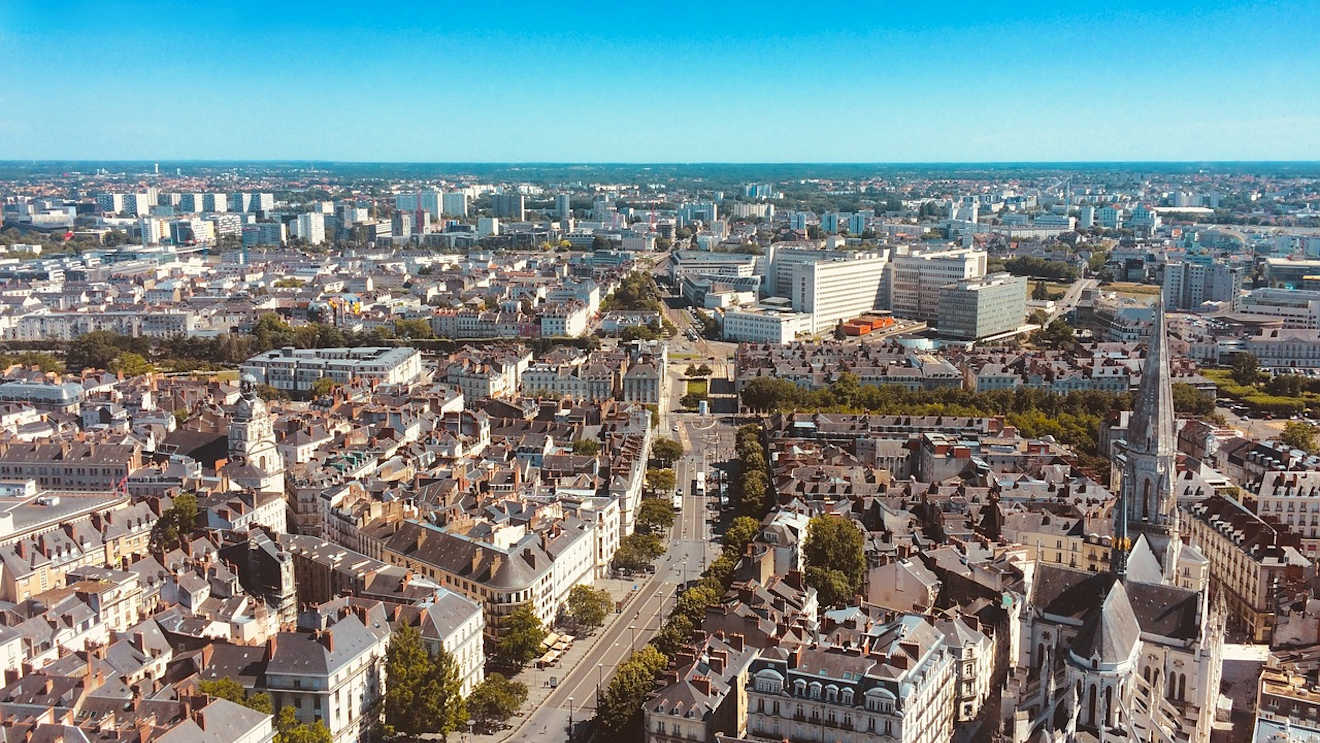 Nantes city in Western France
Nantes city in Western France
So if you are still working, where is the best place to live in France? You need a combination of higher than average wages, plenty of jobs, an international scene, plenty of things to do and see, cheap accommodation and a good transport network.
L'Express magazine recently ran a survey on the best cities and towns in France to move to for work. The overall winner, just narrowly ahead of Rennes, was the city of Nantes. It is interesting, that both these neighbouring cities in the West of France, featured in the top 2. In many ways their recent history follows a similar path.
Both have experienced rapid increases in their population. Nantes has doubled in size since the 1960s and it is now the 6th biggest city in France. The area of greater Nantes is forecast to reach 1 million inhabitants by 2030. The population of both cities is also very young. We have seen above that Rennes has a strong student population, but in Nantes the population under 30 years is over 45%.
Situated on the Atlantic Coast, only 2 hours from Paris, Nantes was ranked just behind Paris and Lyon in a Worldwide Ranking of the Most Connected Global Cities carried out by the GaWC Think Tank. Nantes was rated higher than Strasbourg, Toulouse and Montpellier for its openness to international business and the global reach of its companies. This is perhaps not a surprise given its history as an important French port, but it still outranked both Bordeaux and Marseille. SOURCE: GaWC Global Cities
Nantes is the main business city in the West of France. It has a large Agri-food sector -25% of the agri-food jobs in France are located in Nantes. Many of the leading manufacturers are based in the city, such as: Biscuits St-Michel, BN, Charal, Eurial and Fleury Michon). It is an important centre for Engineering. It is home to one of the finest Engineering Schools in France (École Centrale de Nantes) and it has numerous leading companies in the fields of biotechnology, Composite materials and Gene therapy. Airbus has a large production site in Nantes, employing over 5,000 people.
Nantes was designated by the French government as a Tech Hub for the digital industries sector and other creative industries. Over 1,000 jobs per year are created in the digital sector alone and Nantes has one of the highest number of business start-ups in France.
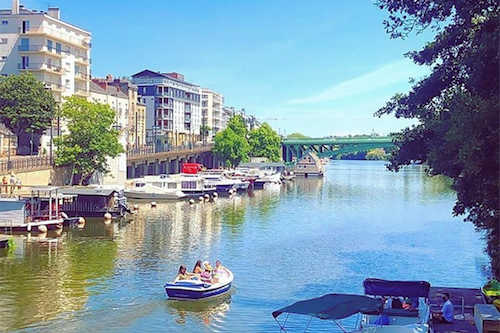 Île de NantesNantes also has a strong tourism sector and it receives over 2 million visits per year (making it the 7th most important French tourist city).
Île de NantesNantes also has a strong tourism sector and it receives over 2 million visits per year (making it the 7th most important French tourist city).
In the centre of Nantes, the last 20 years has seen an incredible amount of regeneration. The Île de Nantes is a large island located in the Loire river in the centre of Nantes and its former docks and warehouses have been transformed into an important business district, commercial centre and area for new housing. There is a Quartier de la création, which is a district dedicated to activities related to e-commerce, software publishing, VR technology and robotics. It is also the new home to the School of Fine Arts and the School of Design.
During 2021, house prices in Nantes increased by +12.3% to stand at an average sale price of €365,000, well above the average for Western France. Similarly, the average price of apartments in Nantes increased by +6.3% to €3,970 per m2.
According to the international Relocation company, Cadogen Tate, Nantes has a well-earned reputation for:
". . . offering an exceptionally high quality of life, a strong jobs market across a wide range of different fields and good salary prospects with a relatively low cost of living . . ."
The website Cost of Live rates Nantes as "affordable". With an average monthly net salary of €1,708 and an average rent of €696 per month (1 bed apartment), it calculates that the average monthly cost of living is €1,209 (covering House Rent + Food shopping + Restaurants + Utilities + Transportation + Entertainment).
Among the other cities in France to feature in the Top 10 places to work, were the following:
Runner-up: Toulouse
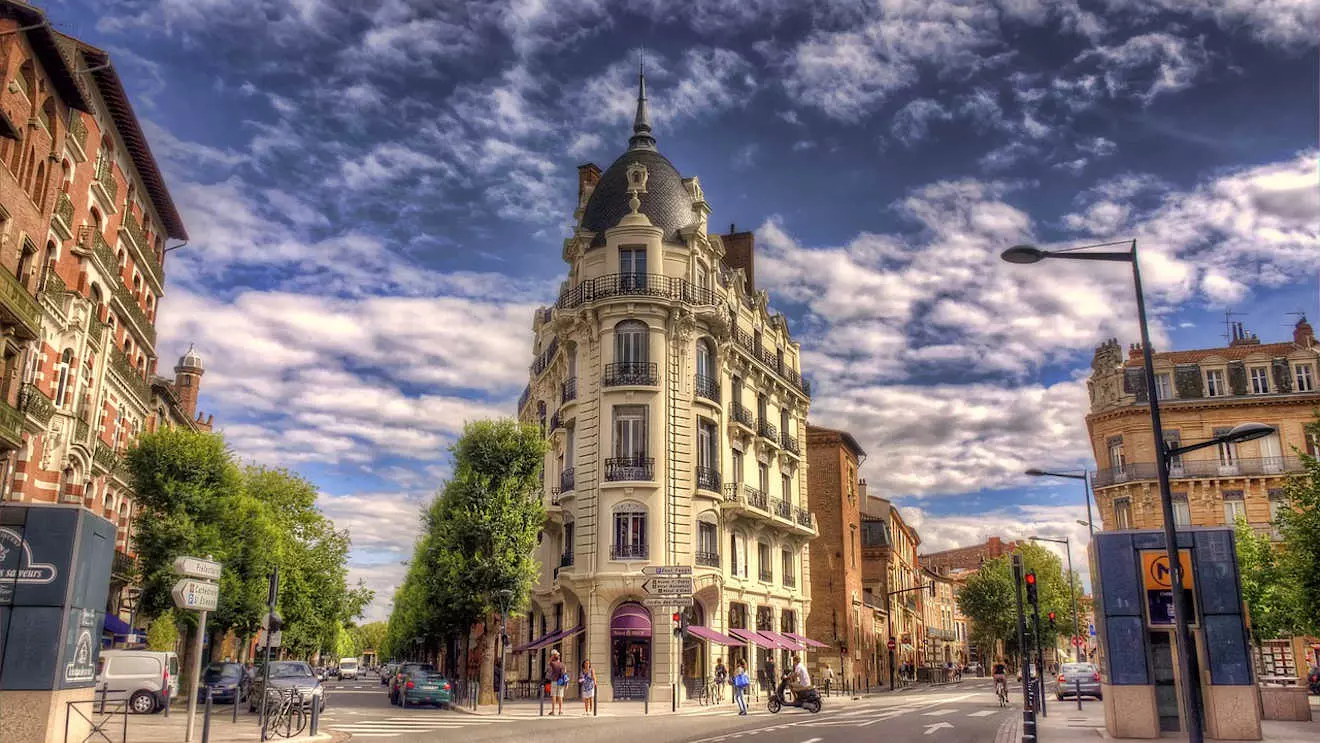 Toulouse Southern France
Toulouse Southern France
Yes, I would agree. Toulouse is a great city. My eldest son recently studied Business at Toulouse. I also used to work for an aerospace company in the UK and I had a couple of trips over to Airbus. When I was working in the Middle East a lot, I used to fly out of Toulouse. So I have got to know it quite well.
Toulouse is the 4th biggest city in France, with just under 500,000 inhabitants. It is a very pretty place, with the wide Garonne river flowing through the middle of the city and the red brick buildings in the centre (giving it the nickname of la ville rose) have hardly changed in the last couple of hundred year. I think because Toulouse hasn't followed the path of other large cities in France of building large shopping malls, the centre of the city has retained much of its character, with narrow cobbled streets and plenty of shops, bars and restaurants. It has a great transport system and it has a real international feel to the place. There is a great bar culture in Toulouse (I would say more pubs, than café bars) and when we have been out drinking in Toulouse, we have always bumped into Americans, Irish people, Brazilians, you name it.
Toulouse is also a great sports city, with both a good rugby and football team (although they did fall out of Ligue 1 last season), as well as a professional basketball and handball team. It also has the most sports facilities of any French city.
Toulouse has a number of prominent Universities, it is the European centre of the Aerospace industry (Airbus) and it is often ranked as the most dynamic French city for business. Toulouse featured at #6 in the list of Best French cities to work.
Close contender: Bordeaux
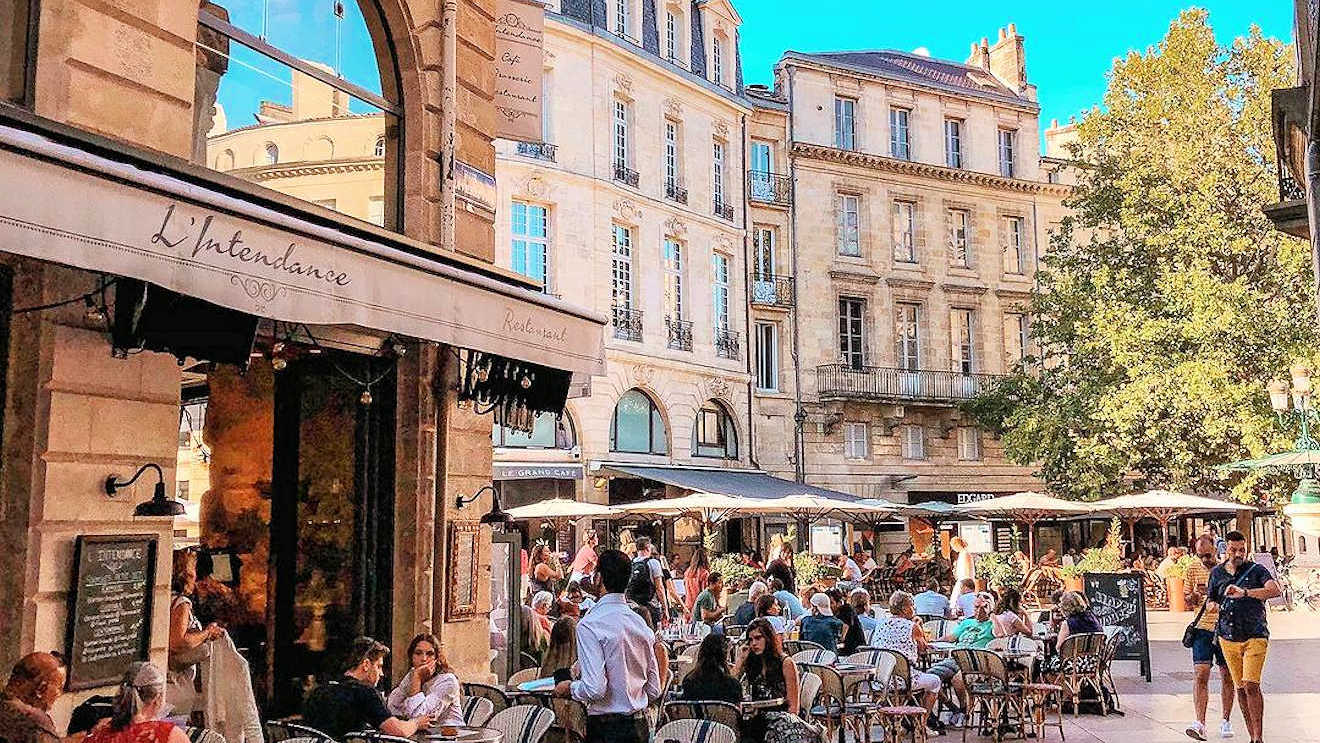 Bordeaux streets
Bordeaux streets
A bit like Lyon (which was voted #3 in the list of best French cities to work in), Bordeaux has a real reputation in France as being a serious business city. Obviously, Bordeaux made its wealth on the back of the wine trade and its port. But Bordeaux is not just about wine today.
Bordeaux has forged itself as a strategic hub for the aeronautics, military and space sector. It is home to such companies as Thalès, the Ariane Group and Dassault Aviation. It is also a major university centre with 100,000 students within the Bordeaux region.
When we visited Bordeaux this summer, I was very impressed with the city. There are some beautiful buildings and squares in the centre of the city, the shopping is really good and I don't think we had a bad meal in the whole time we were there.
Also, the countryside surrounding Bordeaux is really pretty. Make sure you go to Dune du Pilat on the Atlantic coast, which is a massive sand dune (and I mean massive). I also would recommend the town of Libourne, which is about 20 kms from Bordeaux. This is a really pretty place and we had an excellent lunch overlooking the river.
Bordeaux was voted as the 5th best city for working in France, according to the L'Express survey.
Close contender: Clermont Ferrand
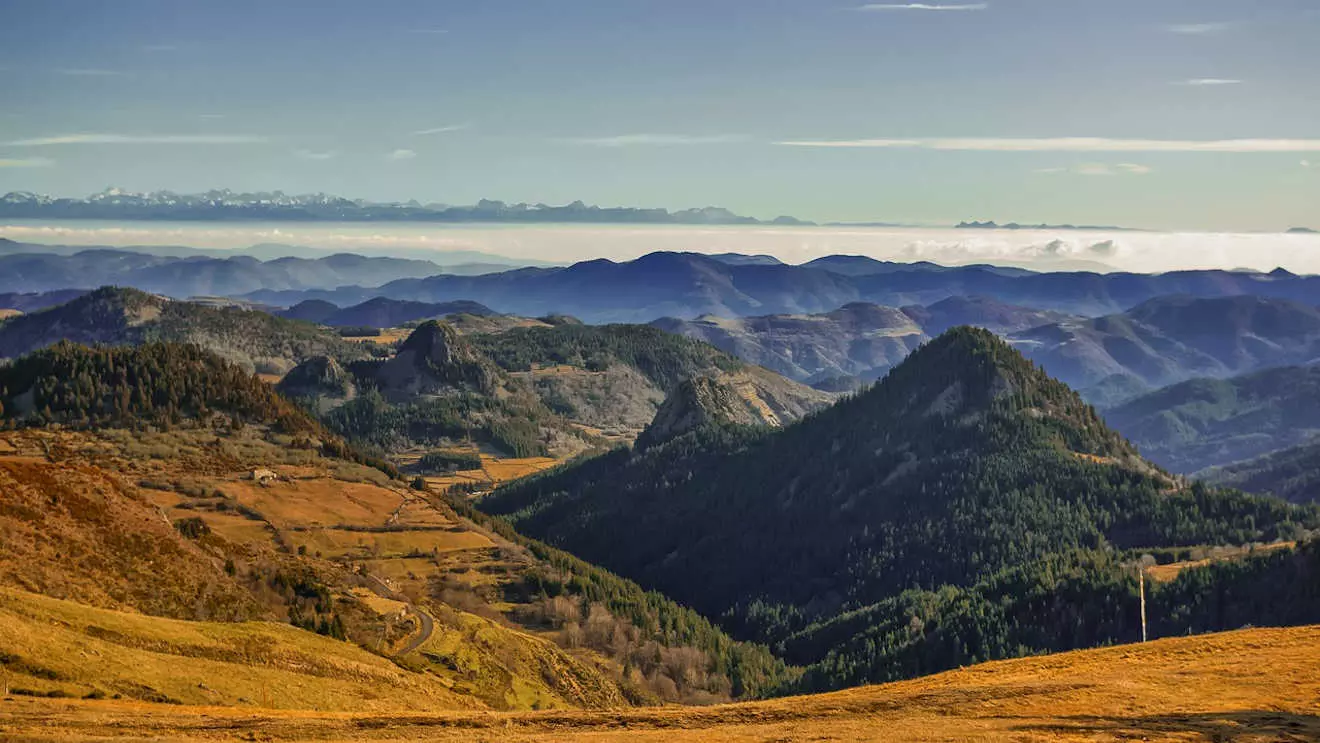 Puy-de-Dôme Auvergne
Puy-de-Dôme Auvergne
Clermont Ferrand is known throughout France as the home of Michelin tyres. It is not a particularly big town (in 2025 its population was 144,000, making it only the 24th biggest city in France). The surrounding countryside of the Auvergne region is very beautiful, especially the Puy-de-Dôme area. We know it very well because some good friends of ours come from Clermont, so we have visited the city with them a number of times.
Aside from Michelin, which still employs some 13,000 people in the town, Clermont is also home to the big pharmaceutical company Merck-Sharp-Dohme (MSD). Also, because of its location right in the centre of France, Clermont has traditionally attracted a number of administration centres for some of the big French institutions (the Banque de France has its Printing Centre located in the town, Clermont is also home to the National Training centre for the police and there are various Tax and Public administration centres).
Clermont Ferrand is quite an affordable place to live, with property prices quite modest compared to the rest of France. You can buy an apartment in the city for around €1,950 per m2 (so €78,000 for a 1 bed apartment and €115,000 for a 2 bed apartment). The average house prices in 2025 were around €200,000. Average salaries in Clermont Ferrand are quite healthy at around €43,000, which is above the national average for France of (€39,099).
SOURCE: L'Express - Le palmarès des villes ou il fait bon vivre et travailler
9. Best places to invest in France: Mulhouse
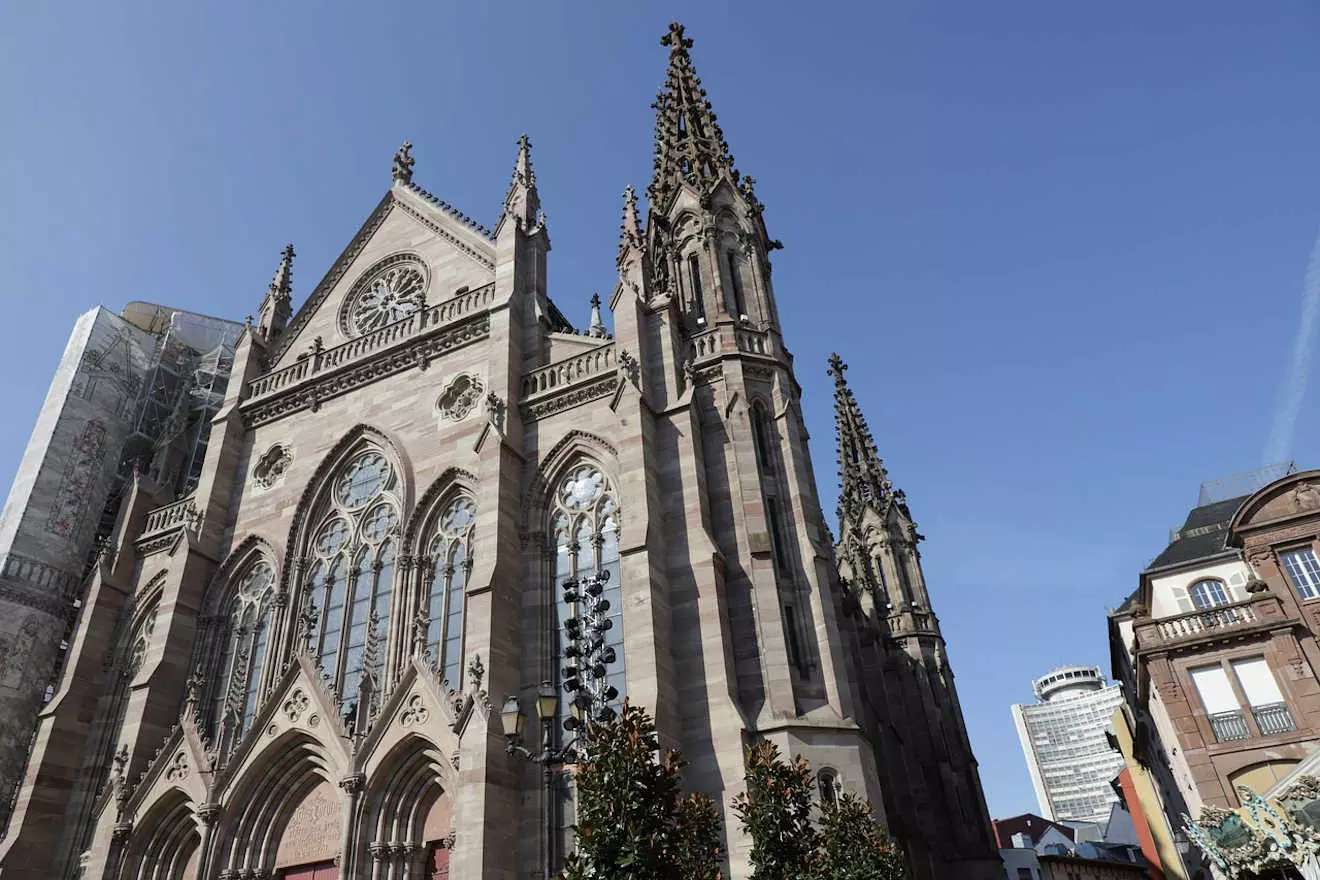 Mulhouse city in Eastern France
Mulhouse city in Eastern France
Mulhouse in the Alsace region of Eastern France, is another town with surprisingly cheap property prices. As such, it provides excellent prospects for property investment in France.
Mulhouse is a fairly large town with a population of around 280,000 people, including the sub-urban districts. It is also one of the 'youngest' towns in France, with over 40% of the inhabitants aged under 30.
It is a fairly pleasant town, with strong links to nearby Germany and Switzerland. The local international airport close to Mulhouse (Bâle-Mulhouse-Friborg (EuroAirport)) serves travellers to each of the 3 countries. In terms of general earnings in France, the average wage rate in Mulhouse is high and the local inhabitants are able to enjoy low housing costs. The average price for apartments in Mulhouse in Q3 2025 is just €1,210 per m2.
Runner up: Caen
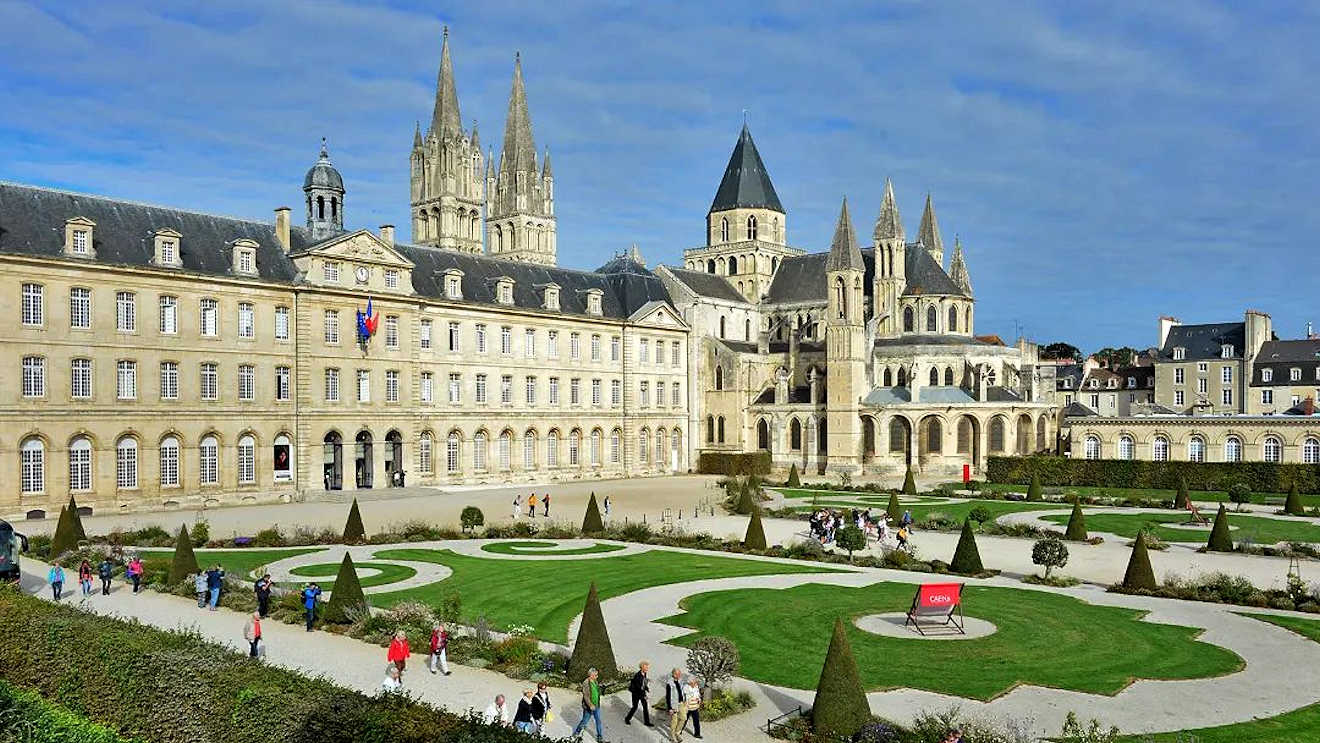 Caen, Northern France
Caen, Northern France
The port-city of Caen on the Normandy coast, could be quite an interesting place to invest in Property. Caen appeared at #9 on the list of Best cities to live in France and was described by L'Express magazine as
" . . . the cultural and intellectual capital of Normandy, with one of the oldest universities in France, retains its aura for economic & cultural dynamism . . ."
During 2025 property prices in Caen increased rapidly. In the 12 months up to November 2025, house prices rose by +8.9%, bringing the average sale price up to €261,000. Apartment prices also increased in Caen, although by a much more modest +8.8% to stand at an average of €2,880 per m2.
Caen is quite a modern city, with a lot of its buildings being constructed after the Second World War. The nearby Normandy beach landings led to intense fighting in the city and much of the old town was destroyed. The city does provide a convenient base for exploring some of the more picturesque coastal towns of Deauville, Trouville and Honfleur.
Close contender: Nimes
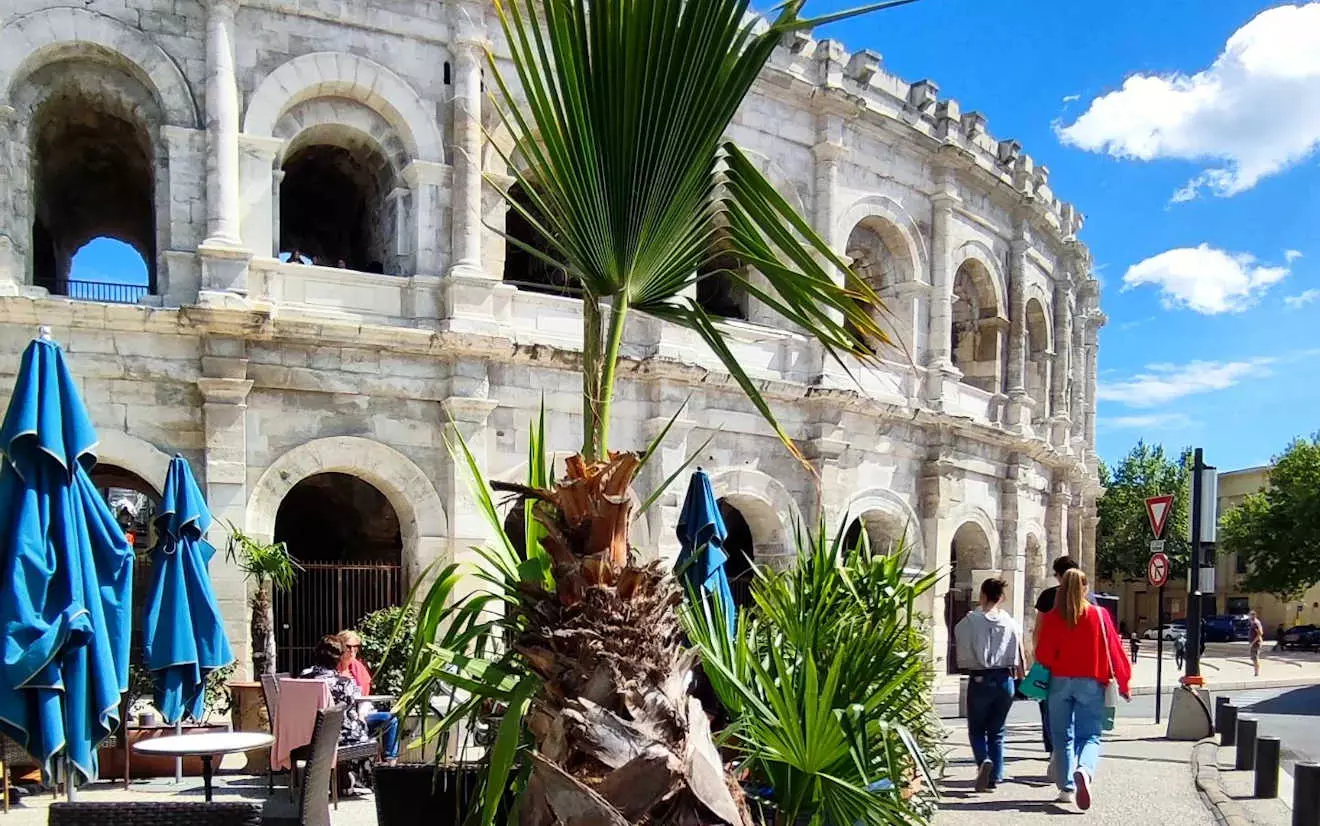 Nimes, Gard department, Southern France
Nimes, Gard department, Southern France
Finally, I would just like to highlight the small city of Nimes in the South of France. Nimes was a former Roman garrison town and it has some beautiful Roman monuments, including a fully intact amphitheatre and the old market forum. Nimes has its own local airport (served by Ryanair flights to UK and Brussels), a TGV train station and the A9 motorway runs right past the city. Nimes is also the gateway to Provence and the beautiful Cevennes region.
Nimes is just 50 kms north of Montpellier, but despite a similar transport infrastructure, old architecture and relaxed way of life; the two cities could not be more different.
Property prices in Montpellier have powered ahead in recent years as more and more people look to move to the city. In 2025, property prices in Montpellier increased by +8.0% and an average house will cost around €395,000. In comparison, a similar house in Nimes will only set you back only €240,300. The Square meter price for apartments in Montpellier are currently running at €3,250 m2, whereas in central Nimes, an apartment costs just €2,070 per m2.
As property market in Montpellier will eventually begin to over-heat, the city of Nimes could be worth a look at.
10. Best cities to live in France: Angers
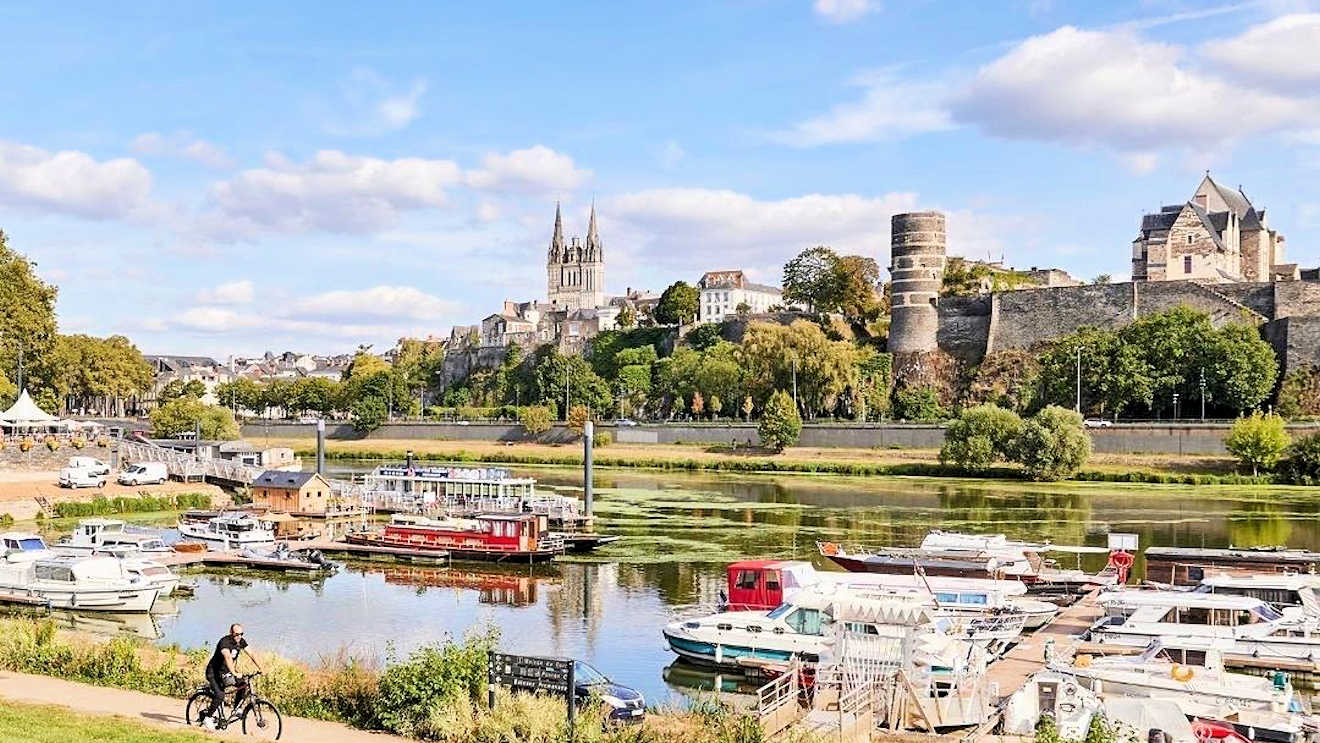 Angers Maine-et-Loire department
Angers Maine-et-Loire department
So we have covered a lot of different categories, but what is the best overall place in France to live, taking into account all of the factors?
- In 2024, the charming city of Angers in Western France, was voted the #1 place to live in France according to the by L'Express magazine survey.
- In the more in-depth 2025 study by the Association Villes et Villages, also placed Angers as the #1 best city to live in France after Annecy, Bayonne and La Rochelle.
So there seems to be some concurrence here. But it is interesting that Angers doesn't appear at all in any of the other surveys and articles on the best places to live in France. Part of this may be due to the fact that Angers doesn't really have the name-check appeal of a Bordeaux or a La Rochelle or Grenoble. We know of Angers because one of our best friends (Luc) lived and worked in the city for many years and he still returns regularly to visit friends and family
Angers is located 120 kms from the Atlantic coast and close to the Loire valley. It forms a triangle with the city of Nantes (80 km to the West) and Rennes (100 km to the North). Angers is a 3 hour drive from Paris.
The most prominent attraction in Angers is the huge castle, which sits overlooking the river. This was a former bastion of the Plantagenet dynasty of King Henry II and formed the base of the Duchy de Anjou.
Angers is also the home town of Cointreau. This world-famous orange-based liqueur was first created in Angers in 1875.
Angers is also famed for its public parks and botanical gardens. In the north of the city, you will find the Terra Botanica, a large botanical garden featuring plants from all over the world. With a total of eighteen parks and public gardens, the city has the highest concentration of green spaces in the whole of France.
The climate in Angers is quite mild. It isn't as wet as some of the towns and cities on the French Atlantic coast, receiving below average rainfall throughout the year. In comparison to Brest in Brittany it receives 50% less average rainfall per year (693mm per year compared to 1,211mm in Brest). The city receives a good amount of sunshine throughout the year and its temperatures are neither too hot in the summer (an average of 22.5°C/71°F) or too cold in the winter (8°C/46°F).
The economy of Angers is also heavily tilted towards horticulture and agronomy. Over 30,000 people are employed in various research facilities, plant-based medicine companies, plant & seed production and market gardening. It is big business and it has helped establish Angers as the European centre for this sector. The European Union set up its headquarters of the Community Plant Variety Office in Angers and its role is to protect new plant varieties across Europe.
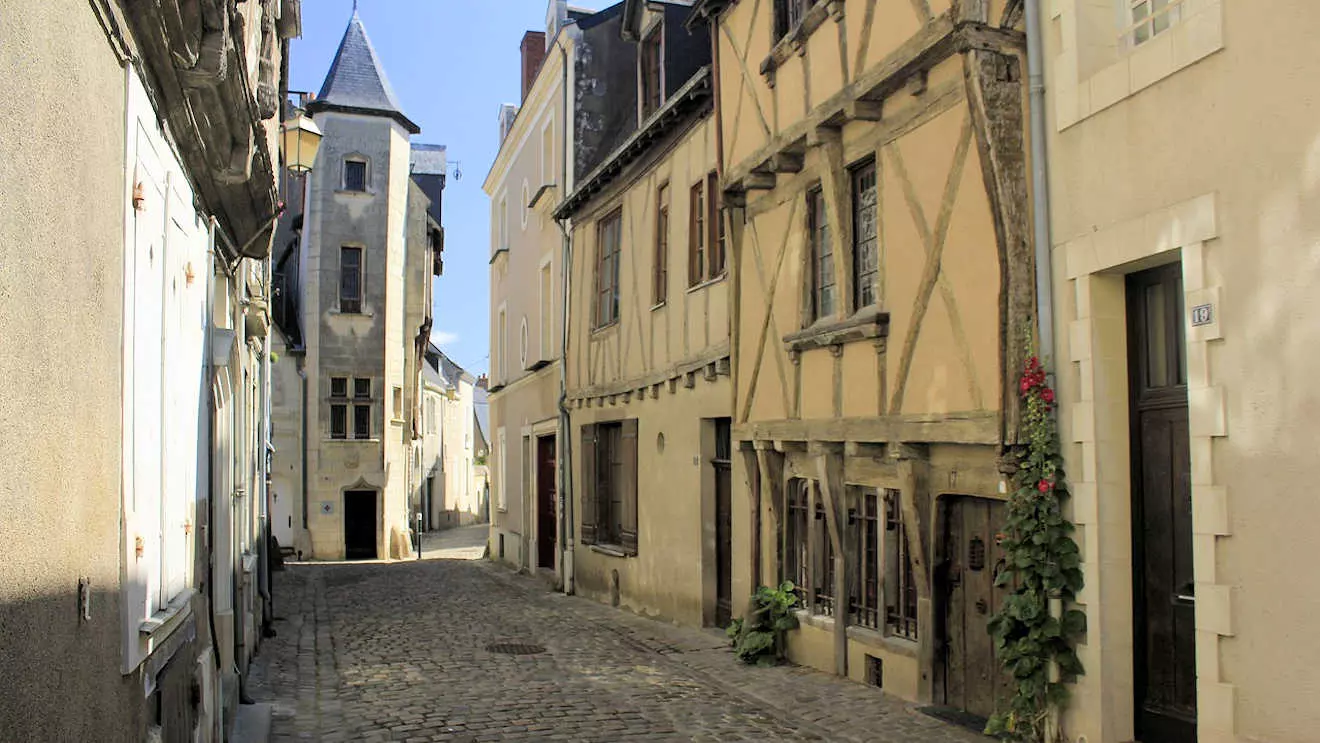 Angers medieval centre
Angers medieval centre
The average salaries in Angers are just above the national average, at around 40 885 € per year and the level of unemployment at 6.70% in 2025, is just below the national average. Property prices in Angers are still very affordable. The average house price is just €293,000 in Q3 2025.
Angers is quite a compact town, with a population of just over 150,000. It is also a very young town, with over 45% of the population under 30 years old. Angers is home to over 35,000 students and is home to numerous universities such as the University of Angers, the Catholic University of the West and the research and higher education centre Nantes Angers Le Mans University.
In terms of transport, Angers is well served by the local road network and it is the sort of city that you can reach quite quickly from any direction. The A11 motorway connects Angers to both Nantes and Paris. The A85 motorway runs east from Angers to Tours and Orleans. There are also fast roads running up to Rennes and down to Poitiers. Angers has its own TGV train station and you can access Paris in under 1 hour 30 mins. Angers does have a small local airport, but there are far more international flights to the nearby airports of Nantes, Rennes, Limoges. Angers has its own electric Tram network and an extensive route of cycle lanes.
Angers features a number of festivals throughout the year, including a film festival every January (Festival Premiers Plans), the Festival d'Anjou a large theatre festival held at the end of June and beginning of July, a free Summer music festival held on the banks of the River Maine in August (Tempo Rives) and the Festival des Accroche-Cœurs a 3 day street theatre festival held in September.
L'Express magazine summarized the appeal of Angers as follows:
. . . Angers provides the best quality of life in France based on a winning cocktail of academic and university excellence, a range of high-end care, sustainable development and reasonable house prices. This human-sized city has managed to preserve its natural spaces and its air quality . . .
Thinking of moving to France ?
If you are planning on moving to France, then the following articles provide more information on applying for a long stay visa for France, retiring in France, opening a bank account, setting up health care in France and the best regions in France to live.
|
Discover how much money you will need to budget for moving to France and the general cost of living in France in 2026.
|
There are 4 main criteria that you must meet on your French Residency application, but the most important on is that you have sufficient financial resources to support yourself in France.
|
|
If you are planning on moving to France and to live here for more than 3 months at a time, then it is a legal requirement for you to have health insurance in place.
|
How to open a bank account in France One of the first jobs that you need to do when you are moving to France is to open a French bank account. Everything in France is linked to having a French bank account.
|
|
Discover the best options for finding properties to rent in France long term and what information you will need to provide to sign a long term lease.
|
Discover how much it will cost to rent a house or apartment in France long term. These are the average house rental prices in France for a long term rentals for 2026.
|
 If you need assistance with planning your move to France and getting set up when you arrive, we are happy to recommend the services of HAMMOND HELP, a French Relocation & Insurance agency run by Nicole Hammond. Nicole's team and network of external consultants, can help you with everything from applying for long stay visas for France, setting up a business in France, opening bank accounts, arranging health insurance in France, organising car & home insurance and completing your French tax return.
If you need assistance with planning your move to France and getting set up when you arrive, we are happy to recommend the services of HAMMOND HELP, a French Relocation & Insurance agency run by Nicole Hammond. Nicole's team and network of external consultants, can help you with everything from applying for long stay visas for France, setting up a business in France, opening bank accounts, arranging health insurance in France, organising car & home insurance and completing your French tax return.
Hammond Help can be contacted by email at: Hammond Help by phone (English speaking line): +33 (0)6 32 07 84 13 and through Facebook: Hammond Help
You can also book a personal 30 minute telephone consultation with Nicole to answer all your questions in relation to your visa application and relocation to France. Visit Visa & Relocation Consultation to reserve a date and time for your consultation.


















